What is an SLP & What do they do?
Speech-language pathology is the scientific study of speech, fluency, feeding and swallowing, and all the mechanisms of speech and language, along with the therapeutic application of corrective and augmentative measures to help people with speech disorders speak and communicate better. It falls under the communication sciences and disorders discipline, which also include the closely aligned—but separate—study of audiology.
Speech-language pathology is focused on a range of human communication and swallowing disorders affecting people of all ages.
- Emerson College - Master's in Speech-Language Pathology online - Prepare to become an SLP in as few as 20 months. No GRE required. Scholarships available.
- NYU Steinhardt - NYU Steinhardt's Master of Science in Communicative Sciences and Disorders online - ASHA-accredited. Bachelor's degree required. Graduate prepared to pursue licensure.
- Arizona State University - Online - Online Bachelor of Science in Speech and Hearing Science - Designed to prepare graduates to work in behavioral health settings or transition to graduate programs in speech-language pathology and audiology.
According to The American Speech-Language-Hearing Association , the following disorders fall under the umbrella of speech-language pathology:
- Speech Disorders : Occurs when individuals have difficulty producing speech sounds correctly or fluently (e.g., stuttering)
- Language Disorders : Occurs when individuals have difficulty understanding others, sharing thoughts, feelings, and ideas, and/or using language in functional and socially appropriate ways; language disorders may also be in the written form
- Communicating with others socially (e.g., greeting others, asking questions, etc.)
- Changing their way of communicating depending on the listener or setting
- Following socially acceptable rules of conversation and story telling
- Cognitive-Communication Disorders : Occurs when individuals have difficulties paying attention, planning, problem-solving, or organizing their thoughts. Many times, these disorders occur as a result of a traumatic brain injury, stroke, or dementia.
- Swallowing Disorders: Occurs when individuals have difficulty eating and swallowing. Swallowing disorders are often a result of an illness, injury, or stroke.
The practice of speech-language pathology includes those who want to learn how to communicate more effectively, such as those who want to work on accent modification or improve their communication skills. It also includes the treatment of people with tracheostomies and ventilators.

Speech-Language Pathology: The Synthesis of Two Fields of Study
Language differs from speech, which is why speech-language pathology is actually the study of two fields.
Speech is the verbal means of communication. It consists of:
- Articulation: How speech sounds are made
- Voice: The use of breathing and vocal cords to produce sounds
- Fluency: The rhythm of speech
Speech problems often occur because a person has difficulty producing sounds due to the incorrect movement of the lips, tongue, and mouth.
Speech problems include:
- Childhood speech apraxia : Neurological childhood speech sound disorder resulting from neuromuscular difficulties, such as abnormal reflexes or abnormal tone
- Adult speech apraxia : Speech disorder caused by neuromuscular difficulties, such as abnormal reflexes or abnormal tone; usually as a result of stroke, traumatic brain injury, dementia, or other progressive neurological disorders
- Dysarthia : Impaired movement of the muscles used for speech production, including the vocal cords, tongue, lips, and/or diaphragm
- Stuttering : Involuntary repetition of sounds
- Speech sound disorders : Includes articulation and phonological processes difficulties
- Orofacial myofunctional disorders : Tongue moves forward in an exaggerated way during speech or swallowing (called tongue thrusts)
- Voice disorders : Includes vocal cord nodules and polyps, vocal cord paralysis, spasmodic dysphonia, and paradoxical vocal fold movement
Language consists of socially shared rules that include how to put words together, how to make new words, what words mean, and what word combinations are best in what situations. Language disorders include:
- Difficulty understanding others: receptive language disorder
- Difficulty sharing thoughts, ideas, and feelings: expressive language disorder
Although speech and language disorders can occur by themselves, they often exist together, which is why speech-language pathology is a combined field of study.
Speech and language disorders are often a result of medical conditions, such as:
- Amyotrophic Lateral Sclerosis (ALS)
- Huntington’s Disease
- Multiple sclerosis (MS)
- Laryngeal and oral cancers
- Right hemisphere brain injury
- Traumatic brain injury
In children, this may also include selective mutism and language-based learning disabilities resulting from:
- Attention deficit/hyperactivity disorder
- Syndromes, such as Down’s syndrome and Fragile X syndrome
- Cerebral palsy
- Failure to thrive
- Low birth weight or premature birth
- Hearing loss
- Intellectual disabilities
- Fetal alcohol spectrum disorder
- Stroke/brain injury
- Cleft lip/palate
What is a Speech-Language Pathologist?
Speech-language pathologists evaluate, diagnose, and treat speech, language, communication, and swallowing disorders. These highly trained clinicians work as part of a collaborative, interdisciplinary team of professionals, which includes physical therapists, occupational therapists, social workers, teachers, physicians, audiologists, and psychologists, among others.
Their job duties include:
- Developing and implementing treat plans based on their professional assessment and recommendation from members of the interdisciplinary team
- Monitoring their patients’ progress and adjusting their treatment plans accordingly
- Documenting patient care and writing reports regarding patient evaluation, treatment, progress, and discharge
- Ordering, conducting, and evaluating hearing, speech, and language tests and examinations
- Educating patients and family members on treatment plans, communication techniques, and strategies for coping with speech/language barriers
- Designing, developing, and employing diagnostic and communication devices or strategies
- Developing and implementing speech and language programs
Though a majority of speech-language pathologists are involved in direct patient care, these professionals also fulfill a number of other roles in areas such as:
- Program coordination and administration
- Teaching at the post-secondary level
- Supervision
- Product development and evaluation
- Consultation
Speech-Language Pathologist Education and Certification
Speech-language pathologists are highly educated and trained clinicians, educators, researchers, and administrators. Speech-language pathologists, at a minimum, hold a master’s degree in Communication Sciences and Disorders (CSD).
Most master’s degrees in CSD are Master of Arts (MA) or Master of Science (MS) programs. Master of Education (MEd) programs prepare speech-language pathology educators.
National certification and states licensure require the completion of a program that has been accredited by the Council on Academic Accreditation in Audiology and Speech Language Pathology (CAA) .
In most states, additional state licensure requirements include completing a supervised postgraduate professional experience and passing a national exam.
Language-speech pathologists can earn the Certificate of Clinical Competence in Speech-Language Pathology (CCC-SLP) through the American Speech-Language-Hearing Association. Certification requirements are similar to state licensing requirements, so state licensed language-speech pathologists generally qualify for the CCC-SLP designation.
The History of Speech-Language Pathology
Speech-pathology as a recognized field of study had its origins in the early part of the twentieth century, when the scientific, academic, and clinical foundations began to take shape and a number of organizations (such as the American Academy of Speech Correction in 1926) focused on speech disorders and speech correction were established.
From 1945 to 1965, speech-language pathology began to evolve, thanks to the introduction of a number of assessment and therapy approaches focused on underlying communication disorders. It was during this time that speech-language pathology researchers and clinicians began focusing their attention on the many WWII soldiers returning from war with brain injuries resulting in aphasia.
This period also gave rise to brain studies, technological advances, and the development of standardized testing procedures, including receptive and expressive language assessment and treatment techniques.
Between 1965 and 1975, advancements in linguistics spurred researchers to begin distinguishing language disorders from speech disorders. Their work enhanced the work of speech-language pathologists, allowing them to begin more effectively treating a variety of language delays and disorders.
Today, speech-language pathology continues to evolve as high-quality research evidence is integrated into practitioner expertise and clinical decision making. The increased national and international exchange of professional knowledge, information, and education in communication sciences and disorders continues to strengthen research collaboration and improve clinical services.
Speech-Language Pathology Resources
- Council on Academic Accreditation in Audiology and Speech Language Pathology (CAA)
- American Speech-Language-Hearing Association
- American Academy of Private Practice in Speech Pathology and Audiology
- International Clinical Phonetics and Linguistics Association
- National Student Speech Language Hearing Association
- National Aphasia Foundation
- Childhood Apraxia of Speech Association of North America
- The Cherab Foundation
- The Voice Foundation
- Selective Mutism Foundation
- Stuttering Foundation of America
- National Institute on Deafness and Other Communication Disorders
Back to Top
- Career Resources
- How to Become a Speech-Language Pathologist
- Both Sides of the Frenectomy Debate
- Certification
- State Licensing Overview
- Student Resources
- What is Speech-Language Pathology?
- CAA-Accredited Graduate Programs
- Directory of CSD and SLP Undergraduate Programs
- Master’s in Speech-Language Pathology
- SLP Clinical Fellowship
- SLP Thesis Track
- 2022 SLP Scholarship Guide
- 2022 Top SLP Master’s Programs
- Practice Settings
- Private Practice
- Telepractice
- Specialty Areas and Disorders
- Ankyloglossia (Tongue Tie) and Lip-Tie Issues
- Aphasia (Post Stroke)
- Apraxia of Speech
- Augmentative and Alternative Communication (AAC)
- Child Language Disorders
- Communication Competency Assessment
- Early Intervention
- Fluency Disorders
- Forensic Speech-Language Pathology
- Laryngeal Imaging
- Late Talkers
- Low-Incidence Disorders
- Multilingual Patients
- Occupational Therapy
- Otoacoustic Emissions Screening
- Patients with Autism
- Patients with Cochlear Implants
- Percutaneous Electrical Stimulation (E-stim)
- Public Health
- Rehabilitation
- Spasmodic Dysphonia
- Stuttering and Cluttering
- Swallowing and Feeding Disorders (Dysphagia)
- Transnasal Esophagoscopy and Pharyngeal/Esophageal Manometry
- Transgender Voice Modification Therapy
- Voice Therapy
- Dual Certification in SLP and Lactation Consultancy
- Continuing Education is Key to Career Versatility and Longevity in This Field
- Do You Speak with an Accent? … You Can Still Be an Outstanding SLP
- The Challenges and Rewards of Working with English Language Learners
- Some Advice on How to Approach Your Clinical Fellowship
- 4 Things a Job Description Can’t Tell You About the Profession
- 5 Things I Love Most About Being an SLP
- Your Guide to Getting Started in Telepractice
- Why Team Player SLPs are Even More Effective Than Superstars
- Why Working With the Entire Family Gets the Best Results in Kids Struggling with Speech-Language Issues
- Type 2 Diabetes
- Heart Disease
- Digestive Health
- Multiple Sclerosis
- COVID-19 Vaccines
- Occupational Therapy
- Healthy Aging
- Health Insurance
- Public Health
- Patient Rights
- Caregivers & Loved Ones
- End of Life Concerns
- Health News
- Thyroid Test Analyzer
- Doctor Discussion Guides
- Hemoglobin A1c Test Analyzer
- Lipid Test Analyzer
- Complete Blood Count (CBC) Analyzer
- What to Buy
- Editorial Process
- Meet Our Medical Expert Board
What Is a Speech Pathologist?
Also Known as a Speech-Language Pathologist (SLP) or Speech Therapist
- What They Do
- Conditions Treated
Training for Speech Pathologists
- When to See an SLP
A speech pathologist, also known as a speech therapist, is a healthcare professional who helps you improve your speech and communication if you have been ill, injured, or have a chronic disability. Speech pathologists may also be called speech-language pathologists (SLP).
Speech pathologists also work with people who have difficulty swallowing food or drink to help them stay safe while eating.
This article examines the important work that speech pathologists do as part of a rehabilitation team of professionals. You will learn what conditions they treat and when you should seek out the services of an SLP.
What a Speech Pathologist Does
A speech pathologist is a trained medical professional who works with patients who are injured or ill and are having difficulty speaking or swallowing. They work to prevent, assess, and treat these disorders in adults and children.
Speech pathologists help people communicate, and this may involve:
- Expressive communication : The ability to communicate verbally and nonverbally
- Receptive communication : The ability to understand verbal and nonverbal communications
Some speech therapists work closely with audiologists (healthcare professionals who treat hearing and balance problems) to ensure that you can hear and understand language correctly. Others work with otolaryngologists , also called ear, nose, and throat physicians (ENTs), to help patients swallow food and drink safely and to assist patients with oral motor function.
Common Specialty Areas
Some speech pathologists have a more generalized practice, while others have a more narrow focus on specific areas or problems such as:
- Social communication
- Voice and vocal hygiene
- Speech sound disorders
Some of the official certifications that a speech pathologist may receive include:
- Intraoperative monitoring
- Fluency disorders
- Swallowing and feeding disorders
- Child language disorders
Speech pathologists seeking specialty certification have to meet education, experience, and clinical practice requirements as established by independent specialty certification boards.
Where Speech Therapists Work
There are a variety of settings in which speech pathologists work. This may include:
- Schools: Speech therapists working in schools help children with speech disorders learn to overcome their communication challenges.
- Nursing homes: Speech therapists in nursing homes help patients with dementia or communication issues caused by other conditions like stroke learn communication strategies. They also work with staff on ways to help residents communicate more effectively.
- Hospitals: A speech pathologist working in a hospital may help diagnose and treat language communication problems and swallowing disorders in hospitalized patients.
- Private practices: Speech pathologists may also work in private practices where they may specialize in one or more language problems or health conditions in specific populations.
Speech pathologists can also work as educators in colleges and universities, and they may be involved in research.
Conditions Speech Therapists Treat
Speech pathologists work with people of various ages and with a variety of conditions. They sometimes work with young children who are having problems speaking properly, or they may help older adults with cognitive communication (communication that is affected by memory, attention, organization, and problem-solving, which are examples of executive functioning ).
A stroke can cause damage to the part of the brain responsible for language and communication. Depending on the extent of the stroke, this loss of ability may be short-term or long-term. A speech pathologist can help someone who is recovering from a stroke regain their ability to speak and understand language.
What is aphasia?
Aphasia is a condition of the brain that affects how you communicate with others. It is caused by damage to the part of the brain responsible for language and can affect your ability to speak and understand what is being said.
Hearing Loss
A speech pathologist may work with other professionals such as audiologists and ENTs to help assess, manage, and treat someone with hearing loss. Some of the things a speech pathologist might do to help someone with hearing loss include evaluating the person's speech, helping them improve listening skills, and working with them to develop alternative communication strategies.
Vocal Damage
Vocal cords can become damaged in various ways including persistent coughing and voice overuse. A speech pathologist can teach you muscle strengthing and voice rehabilitation excercises and other strategies to help your vocal cords heal (such as cough modification).
English Language Learners
If you are learning a new language and wish to alter your accent, you may benefit from the services of a speech-language pathologist, as well. They can help you form words and sounds correctly to alter your normal speech in learning a new language.
Traumatic Brain Injury
Traumatic brain injury after a blow to the head or an accident that affects the parts of the brain that control language can also lead to problems with communication. A speech therapist can help someone with this type of injury recover lost speech and language skills.
Swallowing Disorders
Dysphagia is the medical term for difficulty swallowing. It can be caused by several different medical conditions including muscular problems, a narrowed esophagus, damage caused by gastroesophageal reflux disease, or esophageal cancer.
Untreated dysphagia can lead to problems eating and drinking including choking. A speech pathologist can help you develop strategies for safe chewing and swallowing, including exercises, correct body position, and food preparation recommendations.
People with autism can have difficulty with both written and spoken communication as well as body-language forms of communication such as pointing and waving. Autism is also associated with difficulties relating to and socializing with other people.
A speech pathologist can help people with autism understand communication norms and improve their written and spoken communication skills. They can also work with the families of people with autism on strategies that can help develop communication skills.
Alzheimer's Disease
People with dementia or Alzheimer's disease may develop communication problems as the disease progresses. A speech therapist can help the person develop memory skills and other strategies that will help them communicate.
Speech pathologists also work with the family and caregivers of people with dementia so they can help the person implement communication tools and strategies.
Fluency Disorders
Fluency disorder describes speech patterns characterized by differences in rate and rhythm compared to how most people speak.
Stuttering is the most common example of a fluency disorder. Another example is cluttering, which describes speech that is atypically fast and irregular.
Speech pathologists usually develop an individualized treatment plan for someone with a fluency disorder, which may include strategies such as:
- Minimizing negative reactions to the problem
- Increasing the person's acceptance of the problem
- Improving confidence
- Reducing avoidance behavior
Speech Sound Disorders
Speech sound disorders describe problems articulating words. People with speech sound disorders may be hard for others to understand. This can result in problems with social relationships, at work, or at school.
Speech sound disorders are common in childhood and can be treated with the help of a speech pathologist. The pathologist will look at how the person moves their tongue, lips and jaw and help them learn the correct way to make sounds.
People with speech sound disorders often have other problems with language; their speech therapist can also help them develop strategies to overcome these problems.
Gender-Affirming Voice Therapy
Voice therapy for transgender people can be an important part of gender-affirming healthcare. Learning to speak in ways that align with gender identity can improve a transgender person's quality of life as well as their social and psychological well-being.
A speech pathologist can help a transgender person learn to modify the pitch of their voice in ways that limit fatigue and damage to the vocal cords. They can also help the person learn nonverbal communication, articulation, and other strategies that can help their voice align with their gender identity.
To be a speech pathologist, a person must have a master's degree in communication disorders from a program accredited by the Council on Academic Accreditation in Audiology and Speech-Language Pathology (CAA).
Many undergraduate and graduate programs in speech pathology require time spent observing a speech therapist at work prior to admission. This satisfies the requirement for entry into school and provides a good understanding of what a speech pathologist's job is like.
The first year of work as a speech therapist is called a clinical fellowship year. During this time, aspiring speech pathologists will work under the supervision of a licensed speech pathologist.
Additional steps to becoming a speech pathologist include:
- Obtaining a certificate of clinical competence in SLP (CCC-SLP)
- Passing a national Praxis examination for Speech-Language Pathology
- Applying for SLP licensure in the state in which you will be working
A speech pathologist's education does not end when they leave school and pass the national examination. They must also fulfill continuing education requirements from the American Speech-Language-Hearing Association (ASHA) to maintain their license.
When to See a Speech Pathologist
There are certain instances in which you may need to see a speech pathologist. For example, parents commonly notice small speech or language impairments in their children and seek out an SLP.
Adults may want to work with a speech pathologist to help with new or existing communication or language problems.
If you become hospitalized, you may have a speech pathologist come to your room and work with you at your bedside. They can help you with speech and language, swallowing and diet issues, and can work with other members of a rehab team to ensure that it is safe and appropriate for you to return home.
When to see a medical professional
Many speech and language disorders benefit from the help of a speech therapist, but some are more urgent than others. Any sudden onset of impaired speech should be considered an emergency, as the person may be experiencing a life-threatening problem such as a stroke.
Children should be closely monitored for speech and language development. If your child does not have the language skills expected for their age, it is a good idea to see a speech pathologist as soon as you can.
If you or a loved one is having trouble communicating or understanding language, then working with a speech pathologist may be a good idea.
SLPs treat children and adults with a variety of conditions, including Alzheimer's disease, stroke, neurological injuries, autism, and more. They are trained to assess your condition and offer strategies to improve your expressive and receptive communication and swallowing function.
Pascoe A, Breen LJ, Cocks N. What is needed to prepare speech pathologists to work in adult palliative care?: What is needed to prepare SPs to work in adult palliative care? . International Journal of Language & Communication Disorders . 2018;53(3):542-549. doi:10.1111/1460-6984.12367
American Speech Language Hearing Association. Who are speech pathologists, and what do they do? .
American Speech-Language-Hearing Association. Social communication .
American Speech-Language-Hearing Association. Speech sound disorders .
American Speech-Language-Hearing Association. Clinical specialty certification .
Reilly S, Harper M, Goldfeld S. The demand for speech pathology services for children: Do we need more or just different? . J Paediatr Child Health . 2016;52(12):1057-1061. doi:10.1111/jpc.13318
National Aphasia Association. Stroke .
Johns Hopkins Medicine. Aphasia .
American Speech-Language-Hearing Association. Hearing loss in adults .
American Speech-Language-Hearing Association. Autism (autism spectrum disorder) .
Alzheimer's Association. Strategies to support changes in memory, language and behavior in the early stages of dementia .
American Speech-Language-Hearing Association. Fluency disorders .
American Speech-Language-Hearing Association. Gender-affirming voice therapy advocacy .
SpeechPathologyGraduatePrograms.org. How to become a speech pathologist .
Johns Hopkins Medicine. Identifying speech and language concerns about your child and when should you seek help?
Salary.com. Speech Pathologist Salary in the United States .
By Brett Sears, PT Brett Sears, PT, MDT, is a physical therapist with over 20 years of experience in orthopedic and hospital-based therapy.

- Application Requirements
- Tuition and Financial Aid
- Clinical Placements
- Planning Your Studies
- How to Become a Speech-Language Pathologist: Step-by-Step Instructions
What Does a Speech Pathologist Do?
- Apply Now External link: open_in_new
Speech@Emerson / Resources
August 20, 2020
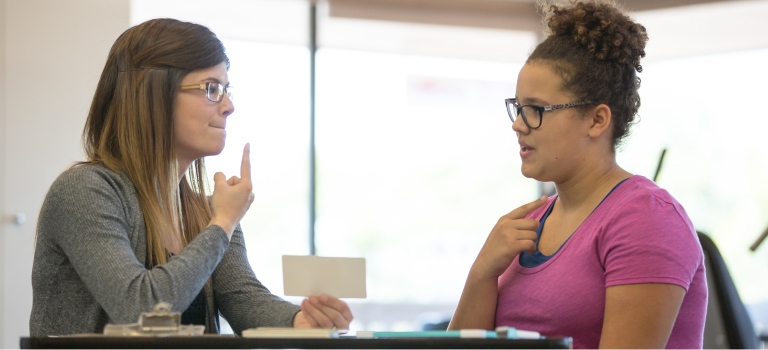
Speech-language pathologists (SLPs) provide care to people with speech, language, cognition or swallowing impairments, from infants to older adults and everyone in between. If you are interested in a health care career that offers an array of specialties, practice settings or clientele, speech-language pathology may be the field for you. This resource will outline what a career in speech-language pathology entails, highlight the differences between a speech-language pathologist and speech therapist, and describe the different settings where SLPs offer their services.
What Is a Speech-Language Pathologist?
A speech-language pathologist is responsible for assessing, diagnosing, treating and developing plans of care to help improve, maintain and restore certain skills and functions in their clients. Such functions include:
- Articulation or phonological disorders, such as dysarthria or apraxia of speech.
- Language processing challenges.
- Language fluency, including stuttering.
- Feeding and swallowing difficulties due to dysphagia.
- Social communication pragmatics.
Licensing requirements to practice as an SLP vary by state, but most require supervised clinical experience and at least a Master of Sciences in Communication Disorders (M.S.). The American Speech-Language-Hearing Association (ASHA) offers certification once individuals have passed the Praxis Examination in Speech-Language Pathology.
So, why become an SLP? The path to becoming a speech-language pathologist requires hard work. But the career comes with the opportunity to improve an individual’s overall quality of life, and that can be rewarding.
Working in a high-growth field is another reason some people might consider a career as an SLP. Speech-language pathologists held about 153,700 jobs in 2018, according to the Bureau of Labor Statistics (BLS). By 2028, the BLS projects that the number of speech-language pathology jobs will reach 195,600.
Speech Pathologist vs. Speech Therapist
What’s the difference between a speech pathologist and a speech therapist? Actually, there isn’t one. Speech-language pathology is the official profession of an individual who is commonly known as a speech therapist or a speech teacher. The terms are used interchangeably to refer to someone who evaluates clients’ unique communication impairments or disorders and determines a specialized course of treatment to help them improve over time.
Job Description of a Speech Pathologist
The day-to-day duties of a speech-language pathologist may vary based on the work setting and area of specialization. However, some key responsibilities SLPs share are as follows:
- Conduct screenings to assess a client’s speech and swallowing challenges.
- Evaluate and diagnose speech, language and communication disorders.
- Develop an appropriate treatment plan.
- Provide rehabilitation or communication strategies for those who are deaf or hard of hearing.
- Train, communicate and educate family and caregivers of those with communication or swallowing disorders.
- Offer augmentative and alternative communication systems for clients who experience challenges with severe social expression or language comprehension disorders, such as those on the autism spectrum.
- Use an interdisciplinary approach to address a client’s communication and swallowing needs.
- Complete administrative tasks, including the recording of a client’s progress during and after treatment and the maintenance of client records.
There are a variety of work settings that a speech-language pathologist can choose from. SLPs can work in nursing and residential care facilities, offices of audiologists and physical therapists or have offices of their own.
Some SLPs choose to specialize in treating and supporting clients of a specific age group, such as young children or older adults. Our Master of Sciences in Communication Disorders (M.S.) program includes applied courses, such as CD642-Autism: Social Communication Development and Disorder, which introduces students to the development of social communication skills in children. By the time students graduate and become licensed, they will be prepared to work with children with autism and help them to build communication and social skills outside of the typical classroom setting. The knowledge and skills acquired during applied courses may also enable students to support adults with autism who may be joining the workforce. In those cases, the SLP provides direction when it comes to writing cover letters and preparing for job interviews.
Our program also includes clinical placements . During in-person placements, our students have the opportunity to grow their practical understanding of the communication disorders that they study in the virtual classroom. They also gain exposure to clinical settings and can decide whether they’d like to work in such an environment once they become licensed.
Speech-Language Pathologists in Hospitals vs. in Schools
Hospitals and schools are two of the most common work settings for speech-language pathologists, according to ASHA. Both settings come with unique challenges and opportunities.
What Does an SLP Do in a Hospital?
Medical speech-language pathologists work in health care facilities such as hospitals. They belong to an interdisciplinary treatment team that designs and implements a client’s acute or rehabilitation care plan. They may collaborate with physicians, psychologists, social workers, audiologists, or physical and occupational therapists to get the job done. The BLS indicates that hospital-based SLPs make up 14% of all practicing SLPs.
A hospital-based or medical SLP’s main job functions may include the following:
- Diagnosing and treating cognitive, language, communication and swallowing disorders.
- Working with a range of clients who suffer from chronic diseases or have been affected by neurological events causing trauma to the brain, such as stroke, seizure, cancer or physical trauma.
- Prescribing modified diet plans for clients experiencing difficulty swallowing and symptoms of dysphagia.
- Conducting periodic screenings.
- Providing guidance, support and education to clients and their primary caregivers.
- Informing clinical staff about communication disorders to provide clients with a holistic health treatment plan.
- Conducting research on treatment methods for communication and swallowing disorders.
What Does an SLP Do in a School?
Speech-language pathologists working in education settings constitute 38% of all SLPs, according to the BLS. Education settings include pre-kindergarten, K–12 public and private schools, and colleges and universities.
SLPs who work in early childhood education settings employ intervention strategies and support students throughout their learning cycles. It is also important for school-based SLPs to advise and work with educators and administrators. This ensures that students’ communication challenges are addressed holistically, so as not to disrupt their learning.
A school-based SLP or speech teacher’s key responsibilities may include the following:
- Conducting diagnostic evaluations and assessing students’ communication skills.
- Working with school-age children or college students with a range of learning, physical and auditory disabilities or disorders that adversely affect their educational performance.
- Identifying students who may be at risk for future communication and swallowing disorders or challenges.
- Consulting with and informing teachers, administrators and families about the prevention of and treatment for communication disorders.
- Performing classroom-based services as well as facilitating small-group and individual speech sessions.
- Working collaboratively to develop a treatment plan tailored to an individual student’s communication and swallowing challenges.
- Developing and implementing Individualized Family Service Plans and Individualized Education Programs.
- Documenting as required by federal, state and local agencies.
- Supervising clinical practicums for students working toward their SLP certification.
- Participating in schoolwide curriculum and literacy teams.
The first step to becoming an SLP and achieving your career goals is earning a Master of Sciences in Communication Disorders (M.S.). To learn more about the Speech@Emerson program, including its length, a look into our online campus and what to expect of immersion experiences, visit our Speech@Emerson program page , contact the admissions team by phone at 855-997-0407 or send an email to [email protected] .
Citation for this content: Speech@Emerson, Emerson College’s online Master of Sciences in Communication Disorders (M.S.)
Request Information
What does a speech language pathologist do?
Would you make a good speech language pathologist? Take our career test and find your match with over 800 careers.
What is a Speech Language Pathologist?
Speech language pathologists (SLPs) specialize in diagnosing, evaluating, and treating various communication and swallowing disorders that can affect individuals of all ages, from infants to the elderly. They work with patients who experience difficulties in speech articulation, language development, voice production, fluency (stuttering), and cognitive communication skills. They also assist individuals who have challenges with swallowing or feeding due to medical conditions or developmental issues.
Speech language pathologists collaborate closely with patients, their families, and other healthcare professionals to create tailored treatment plans that address specific communication or swallowing goals. Their expertise extends beyond assessment and therapy, encompassing research, education, and advocacy to promote effective communication and enhance the quality of life for individuals with communication disorders.
What does a Speech Language Pathologist do?

Speech language pathologists play an important role in the assessment, diagnosis, and treatment of communication and swallowing disorders. They employ a range of evidence-based techniques and technologies to help their clients improve their communication and swallowing abilities. By providing personalized therapy plans, counseling, and education, SLPs help individuals with communication and swallowing disorders achieve their fullest potential and enhance their quality of life.
Duties and Responsibilities Some of the key duties and responsibilities of a speech language pathologist include:
- Assessment and Evaluation: SLPs conduct thorough assessments to identify communication and swallowing disorders in patients. They use standardized tests, observations, interviews, and clinical observations to gather information about a patient's speech, language, voice, fluency, and swallowing abilities.
- Diagnosis: Based on assessment results, SLPs diagnose the specific communication or swallowing disorder affecting a patient. They analyze the collected data and provide a comprehensive understanding of the individual's challenges and needs.
- Treatment Planning: SLPs develop individualized treatment plans tailored to each patient's unique needs and goals. These plans may include strategies to improve speech articulation, language development, voice production, fluency, cognitive communication, or swallowing function.
- Therapeutic Interventions: SLPs administer therapeutic interventions to address communication and swallowing difficulties. They guide patients through exercises, activities, and techniques designed to improve their speech clarity, language comprehension, expression, voice quality, and fluency.
- Patient Education: SLPs educate patients and their families about the nature of the disorder, treatment options, and strategies for managing communication challenges in everyday life. They empower individuals to actively participate in their treatment journey.
- Collaboration: SLPs collaborate with other healthcare professionals, such as physicians, audiologists, educators, and occupational therapists, to provide comprehensive care to patients. They work as part of a multidisciplinary team to ensure a holistic approach to treatment.
- Progress Monitoring: SLPs regularly assess and document their patients' progress throughout the treatment process. They adjust treatment plans as needed based on ongoing evaluations and discussions with patients and their families.
- Adaptive Technology: In some cases, SLPs may recommend and assist patients in using adaptive communication devices or technologies to enhance their ability to communicate effectively.
- Swallowing Assessment and Treatment: SLPs evaluate and treat patients with swallowing difficulties (dysphagia). They may develop strategies to improve safe swallowing and prevent aspiration during eating and drinking.
- Research and Education: Some SLPs engage in research to contribute to the advancement of their field's knowledge and practices. They may also provide training and education to students, colleagues, and the community.
- Advocacy: SLPs advocate for individuals with communication disorders, raising awareness about the importance of effective communication and access to appropriate services.
- Documentation: SLPs maintain accurate records of assessments, treatment plans, progress notes, and outcomes to ensure effective communication with patients, families, and other healthcare professionals.
Types of Speech Language Pathologists Speech language pathologists can specialize in various areas within their field to address specific communication and swallowing challenges. Here are some types of specialized speech language pathologists:
- Pediatric Speech Language Pathologists: These professionals work primarily with children, addressing speech and language disorders that can arise from developmental delays, speech sound disorders, language impairments, and early communication difficulties. They may work in schools, early intervention programs, clinics, or private practice.
- Adult Speech Language Pathologists: Adult-focused speech language pathologists work with individuals who have communication and swallowing difficulties due to neurological conditions, strokes, traumatic brain injuries, or degenerative diseases like Parkinson's. They help adults regain or maintain their communication abilities and improve swallowing safety.
- Accent Modification Speech Language Pathologists: Accent modification specialists assist individuals who wish to modify their speech patterns to improve communication clarity and reduce accent-related misunderstandings, often in professional or academic settings.
- Voice Disorder Speech Language Pathologists: Speech language pathologists specializing in voice disorders work with individuals who have conditions affecting their vocal cords, pitch, volume, or quality of voice. They provide therapy to improve voice production and prevent vocal strain.
- Fluency Disorder Speech Language Pathologists: These professionals focus on treating individuals with fluency disorders, commonly known as stuttering. They use techniques to help individuals improve their speech fluency and manage their disfluencies.
- Augmentative and Alternative Communication (AAC) Speech Language Pathologists: AAC specialists work with individuals who have complex communication needs and may require alternative methods of communication, such as communication devices, symbols, or gestures.
- Swallowing and Dysphagia Speech Language Pathologists: These speech language pathologists specialize in evaluating and treating individuals with swallowing disorders (dysphagia) caused by various medical conditions. They help patients safely consume food and liquids.
- Traumatic Brain Injury (TBI) Speech Language Pathologists: Speech language pathologists with expertise in traumatic brain injuries provide therapy to individuals recovering from head injuries, helping them regain language, cognitive, and communication skills.
- Neonatal Speech Language Pathologists: Neonatal speech language pathologists work with infants in neonatal intensive care units (NICUs), addressing feeding and swallowing difficulties in premature or medically fragile newborns.
- Geriatric Speech Language Pathologists: Geriatric speech language pathologists specialize in addressing communication and swallowing issues in older adults, often dealing with age-related conditions such as dementia and age-related changes in speech and swallowing function.
- Educational Speech Language Pathologists: These professionals work in educational settings, such as schools, to provide speech and language therapy to students with communication disorders, supporting their academic success.
Are you suited to be a speech language pathologist?
Speech language pathologists have distinct personalities . They tend to be social individuals, which means they’re kind, generous, cooperative, patient, caring, helpful, empathetic, tactful, and friendly. They excel at socializing, helping others, and teaching. Some of them are also investigative, meaning they’re intellectual, introspective, and inquisitive.
Does this sound like you? Take our free career test to find out if speech language pathologist is one of your top career matches.
What is the workplace of a Speech Language Pathologist like?
Speech language pathologists work in a variety of settings, such as hospitals, schools, private clinics, rehabilitation centers, and nursing homes.
In a hospital setting, speech language pathologists may work in acute care or rehabilitation settings, providing assessment and treatment for patients with speech and language disorders resulting from medical conditions such as strokes, traumatic brain injuries, and cancer. They may also work with patients who have difficulty swallowing, which can be a common issue for individuals who have had strokes or are recovering from surgery.
In schools, speech language pathologists work with children who have communication disorders, such as stuttering, articulation problems, or language delays. They work with teachers, parents, and other professionals to develop and implement individualized education plans for students. They may also work with students who have hearing impairments, providing assistance with hearing aids and other assistive devices.
In private clinics, speech language pathologists may work with clients of all ages who have a variety of communication disorders. They may specialize in working with specific populations, such as children with autism or adults who have had strokes. In these settings, speech language pathologists work closely with clients and their families to develop treatment plans tailored to the client's specific needs and goals.
Rehabilitation centers and nursing homes may also employ speech language pathologists to work with patients who have suffered from strokes, traumatic brain injuries, or other medical conditions that affect speech and language. In these settings, speech language pathologists may work with patients to improve their ability to communicate effectively, both verbally and non-verbally.
Speech Language Pathologists are also known as: SLP Speech-Language Pathologist
- Partnerships
What Does a Speech-Language Pathologist Do?
- Bouvé Communications
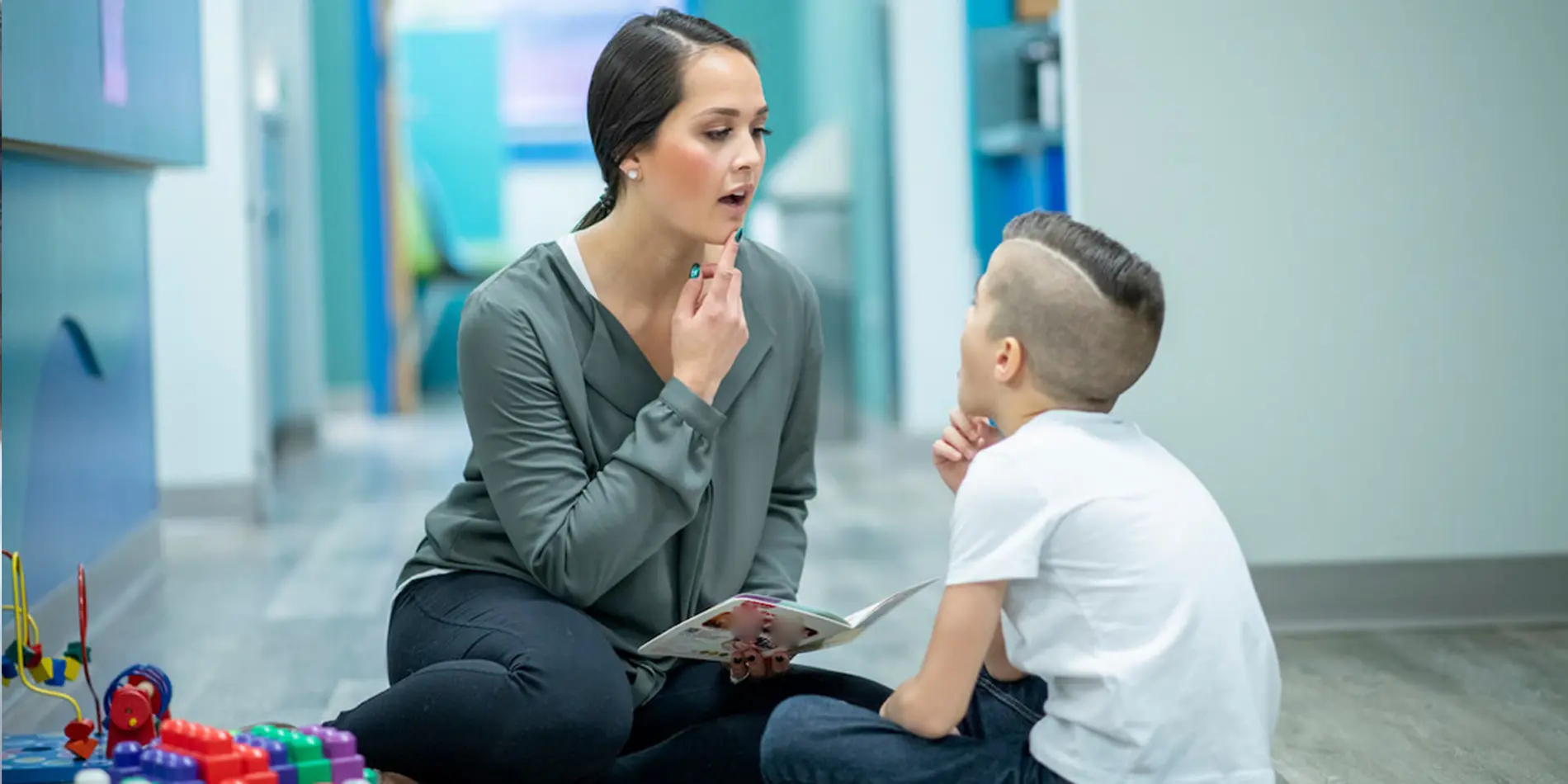
If you are looking for a career that will enable you to make a real and lasting difference in the lives of others, becoming a speech-language pathologist could be an excellent choice for you. Not only do SLPs help their clients and patients lead more fulfilling lives, but they also earn a substantial salary for their efforts.
To become a speech-language pathologist, you will ultimately need to earn a relevant degree, such as a Master of Science in Speech-Language Pathology . Of course, earning an advanced degree will take an investment of time, effort, and money, so it’s only natural to research the field before making such a commitment.
With this in mind, below, we explore common questions about becoming an SLP, including what a speech-language pathologist is, what they do, where they work, and more.
What is a speech-language pathologist?
A speech-language pathologist (often abbreviated to SLP ) is a professional trained to be an expert in all aspects of speech and communication. As such, SLPs provide a range of services to their patients and clients. The most well-known of these services revolve around speech (speech sounds, language, literacy, fluency). SLPs also provide a number of services focused on social communication, cognition, and issues related to feeding and swallowing.
Speech-Language Pathologist vs. Speech Therapist
Ultimately, the terms speech-language pathologist, speech pathologist, speech therapist, speech teacher, and speech correctionist can all be used interchangeably to refer to a practicing SLP. However, the terms speech-language pathologist and speech pathologist are most commonly used in professional settings, while the others are more often used informally.
What do speech-language pathologists do?
Speech-language pathologists perform a range of roles and duties depending on where they are employed and the specific patient populations that they work with. For example, those working in a hospital setting will perform different activities and treatments than those who work in a school or private practice.
“It really depends on the setting that a speech-language pathologist is working in,” says Lorraine Book, department chair and associate clinical professor of Northeastern’s MS in Speech-Language Pathology program . “That being said, their primary role revolves around the assessment and treatment of speech-language disorders and swallowing disorders.”
SLPs dedicate the majority of their time to:
- Evaluating patients
- Diagnosing disorders, such as speech, communication, language, or swallowing disorders
- Creating individualized treatment plans for their patients
- Implementing treatments and interventions
- Training family members or caregivers to oversee treatment in everyday life
- Collaborating with other medical professionals as needed
While speech-language pathologists are perhaps most well-known for working with children in a school setting, they can—and often do—work with patients of all ages.
“As an allied health profession, SLPs are trained to treat across the lifespan, which means birth to death,” Book says.
Conditions Addressed by Speech-Language Pathologists
Because the role of SLP can be so broad, the easiest way to understand it is to explore the specific types of conditions and “problems” that SLPs treat. These include:
- Speech disorders: This category includes any disorder or condition which causes an individual to have difficulty producing sounds. Stuttering, dysarthria, and ataxia of speech can all be considered speech disorders.
- Language disorders: These include any condition which causes an individual difficulty communicating with others. Language disorders include receptive as well as expressive language and can involve spoken or written language. Phonology, morphology, syntax, semantics, and pragmatics are all involved.
- Social communication disorders: Individuals with these conditions have difficulty understanding and adhering to the “rules” of social communication, such as taking turns during a conversation or not interrupting others while they are speaking. Those on the autism spectrum or who have experienced traumatic brain injury commonly exhibit issues around social communication.
- Cognitive-communication disorders: These disorders cause individuals to have difficulty remembering, organizing their thoughts, paying attention, or problem-solving. Stroke, dementia, and traumatic brain injury are often common causes.
- Swallowing disorders: Difficulty feeding and swallowing, known as dysphagia, is common in those who have suffered from a stroke, traumatic brain injury, or certain illnesses or other injuries.
Speech-Language Pathology Careers
Where do speech-language pathologists work.
Speech-language pathologists can work in any setting where they interact with patients experiencing issues or disorders related to language, speech, or swallowing. Typical workplaces include schools, clinics, private practice, and hospitals, among others.
How much do speech-language pathologists make?
According to the U.S. Bureau of Labor Statistics (BLS), speech-language pathologists earn an average salary of approximately $80,500 per year . The number of SLPs is expected to grow roughly 25 percent from 2019 to 2029, adding more than 40,000 positions. This growth is much faster than the four percent growth expected for all occupations in total over the same timeframe.
Becoming a Speech-Language Pathologist
If the role described above aligns with your personal and professional goals, then a career as a speech-language pathologist could be the right one for you. In addition to enjoying competitive wages and significant job growth over the coming decade and beyond, you will be able to make a real difference for the individuals that you treat.
To become an SLP, you will first need to earn an undergraduate degree in a related field (such as a BS in Speech-Language Pathology and Audiology or a BS in Communication Disorders). You will then need to complete a graduate degree, such as a Master of Science in Speech-Language Pathology , a Master of Science in Communicative Sciences and Disorders. After completing a post-graduate fellowship, you will then need to pass the national exam in speech-language pathology and apply for licensure in the field in which you wish to practice.
Interested in becoming a Speech-Language Pathologist? Learn more about the Department of Communication Sciences and Disorders at Northeastern University.
Download Our Free Guide

Career Guide
Learn How to Break Into the Field of Speech-Language Pathology

Related Articles
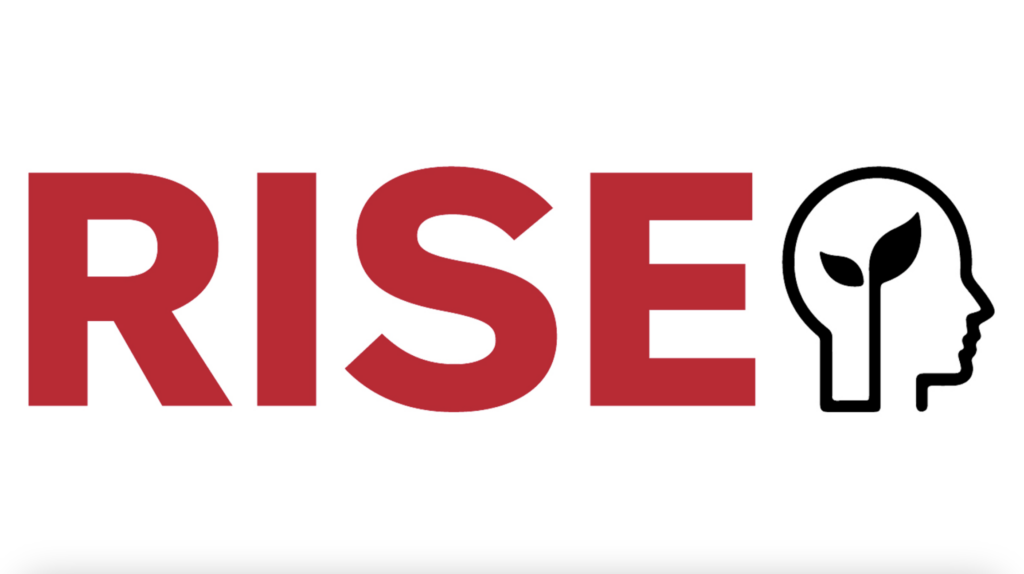
Bouvé Health Equity Interns Present Research at 2024 <strong>RISE Exp</strong>o

Almost half of US prisons are likely contaminated by dangerous ‘forever chemicals,’ new Northeastern research shows

Report says Band-Aids contain PFAS, the ‘forever chemicals.’ Many small exposures can add up to a big exposure, environmental expert warns

Connect with us
Have more questions about Bouvé? We’re here to help.
Want to take the next step and start your journey at Bouvé?
Request more information
Interested in learning more about what Bouvé has to offer?
The Essential Guide to Speech Language Pathology: Meaning, Importance, Process, Education, and Professions
Jump to section.
Use the drop down menu below to jump to a specific section.
Speech and language are essential components of communication and interaction, playing a critical role in our daily lives. Unfortunately, many individuals face challenges with communication due to various disorders, such as stuttering, voice disorders, and language delays. This is where speech-language pathology comes in. In this essential guide, we will explore the field of speech-language pathology, including its importance, the different areas of practice, and the process involved in assessment, diagnosis, and treatment. Additionally, we will delve into the emerging trends and technologies shaping the field and the role of SLPs and other professionals involved in the process.
Main Topics Quick Links
What is Speech Language Pathology?
What is the importance of speech language pathology, what are the different areas speech language pathologists work within & who needs speech language pathology, what is the importance of early intervention in regard to speech language pathology services and treatments, speech language pathology process, the role of the speech language pathologist and other professionals involved in the process, how does one become a speech language pathologist and what the education needed, future of speech language pathology.
Speech language pathology is a specialized field of healthcare that focuses on assessing, diagnosing, and treating individuals with communication and swallowing disorders. According to the American Speech-Language-Hearing Association ( ASHA ), speech language pathology encompasses many areas, including speech, language, fluency, voice, cognitive communication, and swallowing disorders.
SLPs are trained professionals who provide diagnostic and therapeutic services to individuals across the lifespan who are experiencing communication or swallowing difficulties. SLPs work with many clients, including infants, children, adolescents, adults, and the elderly. They may work in various settings, such as hospitals, schools, clinics, private practices, and rehabilitation centers.
The speech language pathology process typically involves several steps: assessment, diagnosis, treatment planning, and therapy. During the assessment phase, the SLP evaluates the client’s communication or swallowing abilities using various methods, such as standardized tests, clinical observation, and interviews with the client and their family members. Based on the assessment results, the SLP diagnoses and develops a treatment plan tailored to the client’s needs and goals. Treatment may involve various techniques and strategies, such as articulation therapy, language therapy, fluency shaping, cognitive therapy, and swallowing therapy.
Speech language pathology is a crucial field that is essential in improving the communication and swallowing abilities of individuals with speech and language disorders. Through the efforts of skilled and knowledgeable SLPs, many individuals can overcome their communication challenges and enjoy a higher quality of life.
- Communication is essential for human interaction, socialization, and learning. When individuals experience speech, language, or communication difficulties, it can significantly impact their quality of life.
- Speech and language disorders can affect individuals of all ages, from infants to the elderly. Without proper intervention, these disorders can lead to difficulties in academic and professional settings, social isolation, and reduced self-esteem.
- Services can help individuals overcome their communication challenges and achieve their full potential. Through assessment, diagnosis, and treatment, SLPs work to improve speech, language, fluency, voice, cognitive communication, and swallowing abilities.
- Early intervention is critical for individuals with speech and language disorders. By identifying and treating communication challenges early on, SLPs can help prevent more severe problems from developing later in life.
- Services can also benefit individuals with other conditions, such as neurological disorders, developmental disabilities, and traumatic brain injuries. SLPs can work with these individuals to improve their cognitive and communication abilities and enhance their overall quality of life.
SLPs work with individuals who have difficulties producing speech sounds correctly. They may use techniques such as articulation therapy, which involves helping the individual learn how to create specific speech sounds, or apraxia therapy, which consists of working on coordinating movements needed for speech production.
SLPs work with individuals with language difficulties, including comprehension, expression, and social use of language. They may use techniques such as language therapy, which involves improving vocabulary, grammar, and sentence structure, or social skills therapy, which consists of helping the individual develop social communication skills.
SLPs work with individuals with difficulties with fluency, such as stuttering or cluttering. They may use techniques such as fluency shaping, which involves teaching the individual to speak more slowly and smoothly or stuttering modification, which consists of helping the individual reduce the severity of their stutter.
SLPs work with individuals who have difficulties with their voice, including hoarseness, breathiness, or vocal nodules. They may use techniques such as vocal hygiene education, which involves teaching the individual how to care for their voice, or voice therapy, which consists of helping the individual improve the quality of their voice.
SLPs work with individuals who have difficulties with cognitive communication, including memory, attention, and problem-solving. They may use techniques such as cognitive therapy, which involves working on cognitive skills such as memory and attention, or compensatory strategies, which include teaching the individual how to use alternative methods to communicate effectively.
In addition to these areas, SLPs may also specialize in working with individuals who have swallowing difficulties, such as dysphagia. They may use techniques such as swallowing therapy or dietary modifications to improve the individual’s ability to eat safely and effectively. They work with individuals of all ages and backgrounds to help them overcome challenges and improve their quality of life.
Improved Outcomes
Early intervention can help prevent future academic, social, and emotional difficulties. Research has shown that children who receive speech and language intervention before age five are more likely to have improved outcomes in language and literacy development.
Faster Progress
Early intervention can also lead to faster progress in speech and language development. When speech and language challenges are identified and addressed early, the individual is likelier to make significant progress in less time.
Prevention of Secondary Problems
Early intervention can help prevent secondary problems that can arise from communication disorders . For example, children with speech and language disorders may develop social and emotional difficulties, such as anxiety or depression, which can impact their long-term well-being.
Cost Effectiveness
Early intervention can be more cost-effective than treating communication and language disorders in later years. Addressing speech and language challenges early makes the individual less likely to require more intensive and costly interventions later in life.
Increased Quality of Life
Early intervention can enhance an individual’s quality of life. When communication and language challenges are identified and addressed early, the individual is better equipped to participate in social and academic activities, which can improve their self-esteem and sense of well-being.
Early intervention is critical in SLP services and treatments. By identifying and addressing communication and language challenges early, individuals are likelier to have improved outcomes, faster progress, and a better quality of life.
Speech language pathology is a process that involves several steps to identify and address communication and language challenges. Here are the steps involved in the SLP process:
Step 1: Assessment
The assessment process involves gathering information about the individual’s communication and language abilities. This may include standardized tests, interviews with the individual and their family members, and observation of the individual in various settings.
Step 2: Diagnosis
After the assessment, the speech language pathologist (SLP) will analyze the information gathered and diagnose the individual’s communication or language disorder. The diagnosis will guide the development of a treatment plan.
Step 3: Treatment Planning
The treatment plan outlines the goals, strategies, and interventions that will be used to address the individual’s communication or language challenges. The plan is tailored to the individual’s needs and may involve collaboration with other healthcare professionals.
Step 4: Therapy
Therapy involves implementing the treatment plan through individual or group therapy sessions. The SLP will work with the individual to improve their communication or language abilities using various techniques, such as articulation therapy, language therapy, or social communication therapy.
Step 5: Monitoring Progress
The SLP will regularly monitor the individual’s progress and adjust the treatment plan. This may involve re-assessing the individual’s communication or language abilities, modifying goals, or changing therapy techniques.
Step 6: Discharge or Ongoing Maintenance
Once the individual has achieved their communication or language goals, they may be discharged from speech language pathology services. Alternatively, they may continue with ongoing maintenance therapy to maintain their progress and prevent regression.
The speech language pathology process involves a thorough assessment, diagnosis, treatment planning, therapy, monitoring progress, and discharge or ongoing maintenance. Through this process, individuals can improve their communication and language abilities and achieve their full potential.
SLPs often collaborate with other healthcare professionals to address the complex needs of individuals with communication and language challenges. Here are some of the professionals involved in the process and their roles:
Audiologists
Audiologists specialize in identifying, diagnosing, and treating hearing disorders that may impact speech and language development. They work closely with SLPs to assess an individual’s hearing abilities and provide appropriate interventions, such as hearing aids or cochlear implants.
Occupational Therapists
Occupational therapists focus on developing an individual’s fine motor, sensory, and visual perceptual skills, which can impact their communication abilities. They work with SLPs to create activities that support speech and language development, such as games or exercises that promote hand-eye coordination. Read more about this profession at AOTA .
Psychologists
Psychologists can provide assessments and interventions for individuals with cognitive, emotional, or behavioral challenges that may impact their communication and language development. They work with SLPs to develop interventions that address the underlying psychological factors that may influence communication and language abilities.
Teachers play a critical role in supporting children’s language and communication development in educational settings. They may work with SLPs to implement communication strategies and interventions in the classroom and provide ongoing support for children with communication and language challenges.
Medical Professionals
Medical professionals, such as pediatricians or neurologists, may refer individuals to SLPs for assessment and treatment. They may also provide medical interventions, such as medication or surgery, to address underlying medical conditions that may impact communication and language development.
Collaboration between these professionals can improve outcomes for individuals with communication and language challenges. By working together, they can provide a comprehensive approach to assessment, diagnosis, and treatment that addresses the complex needs of the individual.
To become a speech language pathologist (SLP), individuals must complete specific education and training requirements:
Step 1: Obtain a Bachelor’s Degree
Earn a Bachelor’s degree in communication sciences and disorders or a related field.
Step 2: Complete a Master’s Degree Program
SLPs must hold a master’s degree in communication sciences and disorders or a related field from an accredited program. The master’s program typically takes two years to complete and includes coursework in the anatomy and physiology of speech, language development, and communication disorders .
Learn more about online masters in communication disorders, including speech pathology .
Step 3: Complete Clinical Practicum
As part of the master’s program, students must complete a clinical practicum. This involves supervised hands-on experience in diagnosing and treating communication disorders.
Step 4: Obtain Certification
Post master’s program, SLPs must obtain certification from the American Speech-Language-Hearing Association . Certification requires passing a national exam, completing 400 hours of supervised clinical experience, and completing a nine-month clinical fellowship.
Step 5: Obtain State Licensure
In addition to national certification, SLPs must obtain state licensure to practice. Licensure requirements vary by state but generally include passing a state exam and completing continuing education.
SLP is an ever-evolving field, with emerging trends and technologies being developed to improve therapy outcomes for individuals with communication disorders. Here are some of the latest trends and technologies in SLP:
Telepractice
Telepractice is using telecommunications technology to provide speech and language therapy services remotely. With the rise of telepractice, SLPs can now offer therapy to individuals who live in remote or underserved areas.
Virtual Reality Therapy
Virtual reality therapy involves using a virtual reality environment to simulate real-life scenarios to aid in speech and language therapy. This technology can improve communication skills in a safe, controlled environment.
Personalized Therapy
Personalized therapy involves creating a therapy plan tailored to the individual’s unique needs. With technological advances, SLPs can now use personalized therapy tools, such as apps and software, to create more effective and engaging therapy sessions. Some insider takes:
- https://stutteringtherapyresources.com/blogs/blog/virtual-reality-for-speech-therapy-soon
- https://news.illinoisstate.edu/2021/11/virtual-reality-in-speech-language-pathology-an-interprofessional-collaboration/
- https://oztrekk.com/news/virtual-reality-helps-speech-pathologists/
Augmentative and Alternative Communication (AAC)
AAC is a system of communication that helps individuals with communication disorders to communicate more effectively. With advances in technology, AAC devices have become more sophisticated, allowing individuals to share using various methods, such as text-to-speech software and eye-tracking technology.
Recent Articles

Want To Communicate More Effectively In The Workplace? Do This!
Within the workplace, it's absolutely critical to be able to communicate clearly and effectively. No matter what business you are in, the ability to speak with precision is essential. If you work in marketing, your ability to communicate clearly with clients and coworkers ensures you deliver the desired product. In…

Why Communications Pros Should Have a Seat at the Executive Table
If you are a communications professional, and you have the ear of the CEO, consider…

What Is The Current State Of Free Speech In The United States?
Free speech may be something that we take for granted in the United States, but…

Health Communication: Too Much, or Not Enough?
Historically, Americans have had a record of obsession with fads promising to help us preserve…

How Soft Skills Can Help You Land a Job
Everyone knows that their resume is an important aspect of landing their next job. Far…

YouTube Shooting Prompts Increased Need for Crisis Communication Experts
The recent tragic shooting at the Silicon Valley headquarters of Google-owned YouTube has highlighted the…

Everything You Need to Know About Communication Disorders
Communication disorders affect nearly 1 in 10 people, and almost 6 million children have a…

Keys to Being a Better Public Speaker and Beating Your Anxiety
At some point in each of our lives, we will be required to give a…

The Importance of Good Etiquette
If you want to land a job, get into a good school, build a strong…

Autism: How it Affects Communication and the Way People are Working to Improve It
Once viewed and addressed as separate disorders, autism spectrum disorder (autism or ASD for short),…

Speech-Language Pathology
- Reference work entry
- First Online: 01 January 2018
- pp 3248–3250
- Cite this reference work entry

- Janet P. Patterson 4
38 Accesses
This is a preview of subscription content, log in via an institution to check access.
Access this chapter
- Available as PDF
- Read on any device
- Instant download
- Own it forever
- Available as EPUB and PDF
- Durable hardcover edition
- Dispatched in 3 to 5 business days
- Free shipping worldwide - see info
Tax calculation will be finalised at checkout
Purchases are for personal use only
Institutional subscriptions
References and Readings
American Speech-Language-Hearing Association. (2005). Evidence-based practice in communication disorders [Position statement]. Available from www.asha.org/policy
American Speech-Language-Hearing Association. (2007). Scope of practice in speech-language pathology [Scope of practice]. Available from www.asha.org/policy
ASHA. (2015). ASHA practice policy. http://www.asha.org/policy/about.htm
Council for Clinical Certification in Audiology and Speech-Language Pathology of the American Speech-Language-Hearing Association. (2013). 2014 standards for the certificate of clinical competence in speech-language pathology. Retrieved December 31, 2015 from http://www.asha.org/Certification/2014-Speech-Language-Pathology-Certification-Standards/
Download references
Author information
Authors and affiliations.
Audiology and Speech-Language Pathology Service, VA Northern California Health Care System, Martinez, CA, USA
Janet P. Patterson
You can also search for this author in PubMed Google Scholar
Corresponding author
Correspondence to Janet P. Patterson .
Editor information
Editors and affiliations.
Department of Physical Medicine and Rehabilitation, Virginia Commonwealth University, Richmond, VA, USA
Jeffrey S. Kreutzer
Kessler Foundation, Pleasant Valley Way, West Orange, NJ, USA
John DeLuca
Independent Practice, Wynnewood, PA, USA
Bruce Caplan
Rights and permissions
Reprints and permissions
Copyright information
© 2018 Springer International Publishing AG (outside the USA)
About this entry
Cite this entry.
Patterson, J.P. (2018). Speech-Language Pathology. In: Kreutzer, J.S., DeLuca, J., Caplan, B. (eds) Encyclopedia of Clinical Neuropsychology. Springer, Cham. https://doi.org/10.1007/978-3-319-57111-9_924
Download citation
DOI : https://doi.org/10.1007/978-3-319-57111-9_924
Published : 20 September 2018
Publisher Name : Springer, Cham
Print ISBN : 978-3-319-57110-2
Online ISBN : 978-3-319-57111-9
eBook Packages : Behavioral Science and Psychology Reference Module Humanities and Social Sciences Reference Module Business, Economics and Social Sciences
Share this entry
Anyone you share the following link with will be able to read this content:
Sorry, a shareable link is not currently available for this article.
Provided by the Springer Nature SharedIt content-sharing initiative
- Publish with us
Policies and ethics
- Find a journal
- Track your research

- Speech Pathology Master’s Programs: Which is Right for You?
- What Can You Do with a Bachelor’s in Speech Pathology?
- Speech Pathology Doctoral Programs
- Online Masters in Speech Pathology at Emerson College (sponsored program)
- Online Masters in Speech Pathology at New York University (sponsored program)
- How to Become a Speech Pathologist: A Step-by-Step Guide
- Guide to Applying to Speech Pathology School
- How to Make a Career Change to Speech Pathology
- Is a Speech Pathology Degree Worth It?
- 10 Reasons to Love Being a Speech Pathologist
- What Is a CCC-SLP and Why It’s Important
- CCC-SLP Requirements: Become a CCC-SLP
- Guide to Applying for CCC-SLP Certification
- CCC-SLP Salary and Career Outlook
- The Guide to the ASHA Speech Pathology Certification Standards
- State-by-State Guide for Speech Pathology License Requirements
- 8 SLP Certifications that May Help Advance Your Career
- How to Become an Effective ASHA Clinical Fellowship Mentor
- How to Complete the ASHA Clinical Fellowship
- The Guide to Speech Pathology Job and Salary Negotiations
- What to Expect at Your First Speech Pathologist Job
- Bilingual Speech Pathologist Salary and Careers
- Child Speech Therapist Career and Salary Outlook
- Speech Pathology Assistant Careers and Salary Outlook
- How to Choose Your Speech Pathologist Career Setting
- Become a Speech Pathologist in a School Setting
- Become a Speech Pathologist in a Hospital Work Setting
- Opening a Speech Therapy Telepractice: What You Need to Know
- Speech Pathology Internships Guide
- Guide to Speech Therapy Volunteer Opportunities
- Choosing Between Speech Pathology or Occupational Therapy
- How to Become an Audiologist
- Scholarships
- Day in the Life of an SLP Student
- Speech Disorder Resources for College Students
- Common Speech Language Pathology Assessment Tools
- The SLP Guide to Evidence-Based Practice
- When to Take Your Bilingual Child to the Speech Pathologist
- When to Take Your Child to the SLP
Home / Speech Pathology Career Guide / The Guide to the ASHA Speech Pathology Scope of Practice
The Guide to the ASHA Speech Pathology Scope of Practice
The ASHA scope of practice is an official policy document of the American Speech-Language-Hearing Association (ASHA) , covering the breadth of practice in speech-language pathology. It defines the job of certified speech language pathologists (SLPs) in the United States—what they do, where they work, and how they help patients. Here’s a summary of the scope of practice—and what it means for you as an aspiring SLP.
What is the ASHA Scope of Practice for Speech Pathologists?
What is a scope of practice? Before getting into that, we first have to understand the role of the ASHA. Borrowing from its website, the ASHA is a “national professional, scientific, and credentialing association” covering a range of disciplines—including speech pathology.
In brief, the ASHA’s scopes of practice details what licensed and certified speech pathologists are expected to do in their respective fields—and what they’re legally allowed to do in their profession. Adhering to scopes of practice are important, both for keeping patients safe and your license from liability.
Focusing on speech pathology, the ASHA’s scope of practice covers the profession in detail. To quote from its website:
“The Scope of Practice in Speech-Language Pathology of the American Speech-Language-Hearing Association (ASHA) includes the following: a statement of purpose, definitions of speech-language pathologist and speech-language pathology, a framework for speech-language pathology practice, a description of the domains of speech-language pathology service delivery, delineation of speech-language pathology service delivery areas, domains of professional practice, references, and resources.”
Definitions of Speech Language Pathologist
The ASHA defines speech language pathologists as:
“..professional[s] who [engage] in professional practice in the areas of communication and swallowing across the life span.”
Communication and swallowing disorders are central to an SLP’s work. These areas are defined below:
- Communication. SLPs who focus on communication help clients and patients in a number of areas, including language, cognition, fluency, resonance, and hearing.
- Swallowing . SLPs who focus on all aspects of swallowing, including feeding and related behaviors.
Speech Language Pathology Framework for SLP Practice
A career in speech language pathology involves helping individuals with swallowing and communication disorders to improve their quality of life. SLPs play a valuable role in their patients’ development and wellbeing.
Practitioners in the field of speech therapy, who must obtain at least a master’s in speech pathology degree , are expected to use high-quality and collaborative research and evidence to inform their decisions. Beyond that, after becoming an SLP , practitioners work across the span of speech language pathology. In general, the ASHA scope divides SLP into service delivery and professional practice.
Though service delivery and professional practice are interconnected—and both invaluable to the discipline at large—they approach SLP from slightly different angles. In brief, service delivery is how SLPs work directly with clients and patients, from direct counseling to screening for and treating medical conditions. The ASHA divides SLP service delivery into eight distinct areas:
- Collaboration
- Prevention and Wellness
- Modalities, Technology, and Instrumentation
- Population and Systems
The professional practice aspect goes beyond clinical practice , encompassing research, education, and administration. This branch of SLP is ideal for individuals who want less direct relationships with patients but still want a lively career in the field. Per the ASHA’s scope of practice, professional practice includes the following five areas:
- Advocacy and Outreach
- Supervision
- Administration/Leadership
Domains of Speech Pathology Service Delivery
Working in SLP service delivery means being comfortable in different fields. Though not an exhaustive list, here’s an overview of the ASHA’s eight service delivery domain areas.
- Collaboration . SLPs are expected to work with colleagues to create a collaborative culture. In practice, that involves encouraging communication and sharing decision-making—both with other professionals and with patients and their families. When working in a team, you’ll be expected to ensure colleagues have the skills and experience to make a difference.
- Counseling . SLPs educate, guide, and support individuals and their families. The best service delivery SLPs will therefore approach their work sensitively—giving emotional support to patients as they battle communication disorders, feeding and swallowing disorders, or related diseases.
- Prevention and Wellness . SLPs often promote prevention and wellness activities—aimed either at preventing disorders before they appear or mitigating their impact once they have. Public awareness is vital here, with SLPs often working to educate people about communication disorders and swallowing problems.
- Screening. SLPs are experts at screening people for possible communication or swallowing disorders. Train as a SLP in service delivery, and you’ll use a range of tools to sharpen screening, including coordinating screening programs and analyzing medical records.
- Assessment . Speech language pathologists are experts in diagnosing different types of communication and swallowing disorder. They understand that some conditions occur developmentally, while others happen in isolation, without any obvious underlying condition. SLPs use a range of techniques to make diagnoses, from interviewing patients and their families to understanding their personal backgrounds.
- Treatment . Speech language services are aimed at helping individuals’ ability to communicate and swallow—improving their quality of life. How treatment looks in practice depends on the patient, but SLPs may find themselves integrating academic research into their therapies, or working with colleagues in related fields.
- Modalities, Technology, and Instrumentation . SLPs use the latest technologies to evaluate and care for people with communication and swallowing disorders. Endoscopy and fibre-optic machines are commonly used to assess swallowing, while ultrasound and other biofeedback systems can help with speech or voice production.
- Population and Systems. Apart from direct care responsibilities, SLPs also have a broader social role. Some focus on education and relating to the public. Others work to reduce the cost of care, liaising with partners to implement case management strategies.
Speech Pathology Service Delivery Areas
What do SLPs actually do in practice? A career in service delivery means helping patients across a range of areas, from fluency to resonance. What exactly you work on will depend on your interests and job, but here’s an overview.
- Fluency and Speech Production . From stuttering to cluttering, helping individuals with fluency is a crucial part of SLP. Speech production is important too, with articulation, motor planning, and phonology all key service delivery areas.
- Language . Encompassing both spoken and written communication, SLPs help people across the spectrum of language. This includes working on literacy, syntax, semantics, phonology, morphology, among other areas.
- Cognition . SLPs often help people with cognitive difficulties. Attention and memory are two common areas of focus, as are problem solving and executive functioning.
- Voice . Supporting patients with phonation quality, pitch, and loudness are important parts of a SLP’s work. Helping them overcome alaryngeal disorders are too.
- Resonance . Service delivery SLPs will be expected to help individuals’ resonance, with hypernasality and hyponasality both pillars of the field. Treating cul-de-sac resonance and forward focus resonance are important areas too.
- Feeding and Swallowing . Service delivery SLPs cover all three phases of swallowing—oral, pharyngeal and esophageal. They’re also expected to deal with atypical eating disorders, including food refusal and negative physiologic responses.
- Auditory Habilitation/Rehabilitation . Hearing loss and deafness can negatively affect an individual’s speech, language, or communication. SLPs are there to help—and support auditory processing in general.
- Elective Services . Though most SLP services are a standard part of the job, more specialized focuses are available too. For instance, some choose to work on transgender communication, while others deal with business communication. Helping people change their accent or dialect is another popular option.
Domains of SLP Professional Practice
Working in SLP professional practice offers a range of career paths, across advocacy, administration, leadership, and more. Here’s a summary of the ASHA’s list of SLP professional practice domains.
- Advocacy and Outreach . From academic literacy to training programs and political action, SLPs promote their profession in a variety of ways. Their ultimate goal is to reduce social and linguistic barriers in SLP—recruiting colleagues from diverse backgrounds and lobbying for funding and recognition from policymakers.
- Supervision . SLPs are responsible for supervising colleagues in the field—from trainees and assistants to clerical staff and other administrative support staff. This work requires strong social skills, as SLPs are expected to promote a collegial atmosphere in their workplace, and support individual growth while providing guidance and support.
- Education . SLPs are often educators, teaching students in universities and colleagues in the workplace. This formal teaching dovetails with educating individuals, their families, caregivers, and policymakers about communication and swallowing.
- Research . Research is crucial to a SLP’s work. Whether focusing on cognition, communication, pragmatics, literacy, and feeding and swallowing, there are plenty of areas to explore—either in specific facilities or across different institutions.
- Administration and Leadership . SLPs administer programs in schools, universities, healthcare settings, and more. Their responsibilities may include making financial and personnel decisions, designing programs, ensuring regulatory compliance, and cooperating with outside agencies.
Disclaimer: The information in this content is from the American Speech-Language Hearing Association as of August 2020. SpeechPathologyMastersPrograms.com is not responsible for changes that may occur after this date. Check ASHA’s website for the most up-to-date information.
CAREER PATHWAYS
Looking for the perfect job? Explore our Career Guides!
How to Become a Speech-Language Pathologist
By Andrea Delgado
Published: March 31, 2024
If you’re intrigued by the field of communication disorders and have ever wondered how to become a speech therapist, this guide is your compass to navigating the path. Delving into the multifaceted world of speech-language pathology, we’ll uncover the essential steps required to embark on this rewarding career journey. From the ins and outs of obtaining a speech-language pathologist degree to unraveling the intricacies of the job description and delving into the question of how much speech therapists make, this article is your comprehensive roadmap to becoming a proficient and compassionate speech-language pathologist.
Career Summary
How much do speech-language pathologist make.

The income of speech-language pathologists can differ due to various factors.
Here’s a basic overview of the salary spectrum for speech-language pathologists at different stages, using data from glassdoor.com :
- Entry Salary (US$86k)
- Median Salary (US$103k)
- Executive Salary (US$124k)
It’s noteworthy that the average salary of speech-language pathologists in the United States surpasses the national average income for all occupations, which stood at around $61,900 in May 2022.
Speech-Language Pathologist Job Description
Speech-language pathologists, also known as speech therapists, are essential in improving communication and swallowing skills for various age groups. They diagnose and treat speech and language disorders through personalized therapy plans. The profession offers intrinsic rewards, as speech-language pathologists profoundly impact lives by fostering effective communication and restoring confidence.
Speech-Language Pathologist Career Progression
The career progression for a Speech-Language Pathologist (SLP) is both fulfilling and diverse, offering opportunities for growth and specialization.
As you embark on your journey in this field, your path may evolve as follows:
- Entry-Level Practitioner: As a newly certified SLP, you’ll likely start your career as an entry-level practitioner. In this role, you’ll gain valuable hands-on experience working with a variety of clients, diagnosing and treating speech, language, voice, and swallowing disorders.
- Clinical Expertise: With experience, you’ll refine your clinical skills and develop expertise in specific areas of speech-language pathology. This may include specializing in pediatric speech disorders, voice therapy, fluency disorders, or adult neurogenic communication disorders.
- Supervision and Mentorship: As you progress in your career, you may have the opportunity to take on supervisory or mentoring roles, providing less experienced SLPs with valuable insights and support to help them grow in their careers.
- Advanced Practice and Leadership: As you accumulate experience and expertise, you might step into more advanced roles, such as a clinical coordinator, department head, or director of a speech therapy program.
- Teaching and Academia: For those with a passion for education, transitioning into teaching roles at universities or colleges may be a natural progression. Advocacy and Leadership in Professional Organizations: Throughout your career, you may choose to become involved in professional organizations related to speech-language pathology.

- Improving Lives
- Meaningful Connections
- Diverse Work Settings
- Constant Learning and Problem-Solving
- Holistic Approach
- Emotional Toll
- High Caseloads
- Administrative Tasks
- Challenging Behaviors
- Limited Resources
Valuable Skills to Have as a Speech-Language Pathologist
- Effective Communication
- Active Listening
- Empathy and Patience
- Diagnostic Skills
- Therapeutic Techniques
Popular Speech-Language Pathologist Specialties
- Pediatric Speech-Language Pathology
- Adult Speech-Language Pathology
- Voice Therapy
- Fluency Disorders
- Accent Modification

Start by completing a bachelor’s degree in communication sciences and disorders or a related field . While a specific bachelor’s degree is not always required, having a solid foundation in relevant coursework is essential. Maintain a strong GPA and participate in related extracurricular activities.
Do I need a degree to become a Speech-Language Pathologist?
Yes, to become a licensed and certified Speech Language Pathologist (SLP), you typically need to have a relevant degree . The most common educational path involves earning a Master’s degree in Speech-Language Pathology from an accredited program. This degree provides the necessary coursework and clinical training to prepare you for a career as an SLP.
While a Bachelor’s degree is a starting point, it usually does not qualify you to practice as a licensed SLP. The Master’s degree is the standard requirement to gain the necessary knowledge and skills to diagnose and treat communication and swallowing disorders effectively.
Apply and enroll in a Master’s program accredited by the Council on Academic Accreditation in Audiology and Speech-Language Pathology (CAA) . During this program, you’ll complete coursework and clinical practicum, and gain hands-on experience working with clients under supervision.
How long does it take and how much does it cost to get a degree in Speech-Language Pathology?
The duration and cost of obtaining a degree in Speech-Language Pathology can vary depending on several factors, including the type of degree pursued, the educational institution, and whether you attend full-time or part-time.
Here’s a general overview:
- Bachelor’s Degree: A bachelor’s degree in communication sciences and disorders or a related field typically takes around 4 years of full-time study . The cost of a bachelor’s degree can vary widely based on factors such as whether you attend a public or private institution, your residency status, and any financial aid you receive.
- Master’s Degree: The most common path to becoming a licensed SLP is to earn a Master’s degree in Speech-Language Pathology. A master’s program typically takes 2 years of full-time study to complete. The cost can vary significantly based on the same factors mentioned earlier, including the institution you attend and available financial aid. The cost of tuition and fees for a master’s degree in Speech-Language Pathology can range from approximately $20,000 to $80,000 or more for the entire program.
- Doctoral Degree (Ph.D. or Au.D.): Some individuals may choose to pursue a doctoral degree in Speech-Language Pathology, which can take an additional 3 to 5 years of study beyond the master’s degree . Doctoral programs are often research-focused and can lead to advanced clinical and academic roles. The cost of doctoral programs can vary widely as well.
Can I complete an online degree program in Speech-Language Pathology?
Yes, it is possible to complete an online degree program in Speech-Language Pathology, but there are important considerations and limitations to be aware of.
Some institutions offer online bachelor’s degree programs in communication sciences and disorders or related fields. These programs typically cover foundational coursework and may have limited clinical components. However, keep in mind that a bachelor’s degree alone may not qualify you to become a licensed Speech-Language Pathologist. A master’s degree is generally required for professional practice in this field.
Online master’s degree programs in Speech-Language Pathology are available from certain universities. These programs often combine online coursework with in-person clinical experiences. It’s crucial to ensure that the online program is accredited by the Council on Academic Accreditation (CAA) to meet licensure and certification requirements.
Clinical experiences and supervised hands-on training are essential components of becoming a qualified SLP. Some online programs may require you to complete clinical practicum hours at approved sites, which could be arranged in your local area. Check with the program to understand how clinical experiences are integrated.
Thoroughly research and compare different online programs to ensure they align with your career goals, offer the necessary clinical experiences, and provide the support you need for successful learning.
Keep in mind that while online programs offer convenience, the field of speech-language pathology involves practical skills and hands-on interactions with clients. Be prepared to actively seek out and participate in clinical experiences to gain the practical knowledge required for licensure and certification.
What are some web resources to learn skills to become a Speech-Language Pathologist?
There are several reputable online resources that can help you learn skills and gain knowledge to become a Speech-Language Pathologist (SLP). These resources offer a range of educational materials, courses, and tools to support your learning journey.
Here are some options:
- American Speech-Language-Hearing Association (ASHA): ASHA’s website provides a wealth of information, including articles, resources, and professional development opportunities for current and aspiring SLPs. You can access research, guidelines, and updates related to the field.
- SpeechPathology.com : This platform offers online courses, webinars, and resources for SLPs and students. You can find a variety of topics, from assessment techniques to treatment strategies, and earn continuing education units (CEUs) to maintain your licensure.
- Speech Therapy Activities and Materials from Teachers Pay Teachers: Teachers Pay Teachers offers a collection of speech therapy materials, activities, and resources created by SLPs for SLPs. These materials can help you develop therapy plans and engage clients.
- National Center for Voice and Speech (NCVS): NCVS provides resources related to voice and speech, including research articles, exercises, and tools for voice assessment and therapy.
- Pearson Clinical : Pearson Clinical offers assessments and resources for speech-language assessment and intervention. Their website provides information about various assessment tools and intervention strategies.
Speech-Language Pathology 101
This introductory lecture serves as a comprehensive “crash course” in speech-language pathology, providing valuable insights into the profession’s broader scope beyond speech correction, covering four common treatment areas.
Practical Experience
Practical experience is crucial for an aspiring SLP because it bridges the gap between theoretical knowledge and real-world application. Through hands-on experience, you will develop essential clinical skills, refine diagnostic and therapeutic techniques, and gain the competence needed to effectively address diverse communication and swallowing needs across patient populations.
Most graduate programs in speech-language pathology require students to complete a supervised clinical practicum, wherein they work directly with clients in on-campus clinics or affiliated off-campus sites. Other common avenues include:
Internships
Students often engage in internships during their graduate program, working in settings like schools, hospitals, or private clinics to gain hands-on experience under the guidance of licensed SLPs. To find internship opportunities, consider reaching out to universities with speech-language pathology programs, local clinics, hospitals, schools, and professional organizations like the American Speech-Language-Hearing Association (ASHA). Networking, attending conferences, and checking job boards can also help you.
Externships
Some programs offer externship opportunities, allowing students to work in specialized settings or with specific populations, such as those in medical settings or specialized rehabilitation centers.
Clinical Fellowships
After obtaining your master’s degree, you’ll need to complete a clinical fellowship, which is a period of supervised professional practice. The CF typically lasts about nine months and involves providing direct services to clients while being supervised by a licensed and experienced SLP.
Essential Skills You Will Learn as a Speech-Language Pathologist
As a Speech Language Pathologist (SLP), having a versatile toolkit of skills is vital for making a real impact on your clients and delivering effective care.
Here’s a rundown of important skills that can enhance your success in this field:
- Effective Communication: Being able to communicate clearly and compassionately is the cornerstone of speech-language pathology. Your ability to convey information to clients, families, and fellow healthcare professionals in a way that’s both understandable and empathetic is key.
- Active Listening: Actively tuning in to your clients helps you grasp their needs, concerns, and progress. This skill lets you tailor your strategies and offer personalized support.
- Empathy and Patience: Collaborating with individuals dealing with communication challenges demands patience and empathy. Creating a nurturing and understanding atmosphere allows clients to learn and grow at their own pace.
- Diagnostic Skills: Nailing down and diagnosing different communication disorders is a must. A strong knack for diagnostics forms the foundation for crafting customized treatment plans.
- Therapeutic Techniques: Being skilled in a range of therapeutic techniques – think articulation therapy, language interventions, and alternative communication methods – boosts your ability to tackle a wide spectrum of communication issues.
- Observational Skills: Sharp observation helps you catch even the smallest shifts in clients’ behavior, communication, or progress. This keen eye allows you to adjust your approach as needed.
- Adaptability: Since every client is a unique puzzle, the ability to flex your methods to fit their distinct needs is key to achieving positive outcomes.
- Problem-Solving: Your knack for thinking creatively helps you devise innovative fixes to challenges that might crop up during therapy or in everyday situations.
- Cultural Competence: Sensitivity to diverse cultural backgrounds is essential for effectively assisting a wide array of clients. Respecting their beliefs and values paves the way for successful collaborations.
- Collaboration: Teaming up with other professionals like educators, doctors, and occupational therapists fosters a well-rounded approach to client care and amplifies treatment success.
- Technological Proficiency: Being comfortable with technology, from communication devices to software, streamlines therapy sessions and empowers clients to enhance their communication skills.
- Time Management: Balancing multiple clients, administrative tasks, and documentation calls for top-notch time management skills to ensure your therapy remains efficient and impactful.
- Research and Lifelong Learning: Staying abreast of the latest research and continuously seeking ways to develop professionally ensures that you’re delivering top-tier care.
- Compassion and Advocacy: Treating your clients and their families with compassion while standing up for their needs fosters a holistic and patient-centered therapy approach.
By honing these skills, you’ll be well-prepared to shine as a Speech-Language Pathologist, offering comprehensive and caring support to individuals striving to enhance their communication and overall quality of life.
Licensure and Certification
Gaining the required licenses and certifications is a crucial step toward becoming a practicing speech-language pathologist (SLP). To begin, you’ll need to secure state licensure, a process that entails satisfying the particular criteria established by your state’s licensing board. This often involves completing a master’s degree in speech-language pathology, gaining supervised clinical experience, and possibly passing a state-specific exam.
Furthermore, you have the option to pursue certification through the American Speech-Language-Hearing Association ( ASHA ). This prestigious recognition involves successfully completing the Praxis examination in Speech-Language Pathology , a comprehensive test assessing your knowledge and skills in the field. Alongside exam success, meeting specific eligibility prerequisites set by ASHA is also a prerequisite for certification.
Ultimately, obtaining both state licensure and ASHA certification solidifies your professional competence and ensures you meet the standards required to provide quality care as a certified speech-language pathologist.
Professional Development and Continuing Education
After becoming licensed and certified, your journey as an SLP continues with ongoing professional development. Stay updated with the latest research, techniques, and advancements in the field through workshops, conferences, and additional certifications. This helps you provide the best possible care to your clients and ensures your ongoing competence as a practitioner.
What’s the Career Outlook for Speech Language Pathologists?
According to the Bureau of Labor Statistics (BLS), the field of speech-language pathology is anticipated to experience a 21 percent expansion in employment between 2021 and 2031, surpassing the average growth rate for all job sectors. On average, approximately 14,000 job opportunities for speech-language pathologists are predicted to emerge annually over the course of the next decade.

What are the Job Opportunities and What Type of Companies Hire Speech-Language Pathologists?
Speech Language Pathologists (SLPs) have a wide range of job opportunities across various settings, allowing them to work with diverse populations and address different communication and swallowing disorders.
Here are some common job opportunities for SLPs:
- Schools: SLPs in schools work with students who have speech and language disorders, helping them improve their communication skills and succeed academically. They collaborate with teachers, develop Individualized Education Programs (IEPs), and provide therapy services.
- Hospitals and Medical Centers: In medical settings, SLPs work with patients recovering from conditions like strokes, traumatic brain injuries, and surgeries that affect communication and swallowing. They assess and treat patients to help them regain their communication abilities.
- Rehabilitation Centers: SLPs in rehabilitation centers provide therapy to individuals undergoing recovery from various injuries, surgeries, or medical conditions that impact their speech, language, or swallowing.
- Nursing Facilities: SLPs in these facilities work with elderly patients who may have communication or swallowing disorders, often related to age-related conditions.
- Home Health Care: Some SLPs provide services to clients in their own homes, particularly those who have difficulty accessing traditional clinical settings.
- Early Intervention Programs: SLPs in early intervention programs work with infants and toddlers who have developmental delays or communication disorders, helping them develop crucial communication skills from a young age.
- Corporate or Professional Communication Training: SLPs can offer communication and presentation training to professionals in various industries to enhance their communication skills.
- Accent Modification Programs: SLPs can specialize in helping individuals modify their accents to improve communication clarity in a new language.
- Private Practice or Clinic: Some SLPs choose to establish their own private practices or work in private clinics. This offers them the flexibility to specialize in specific areas and work directly with clients.
- Telepractice: With advances in technology, SLPs can provide therapy remotely through telepractice, offering their services to clients who may not have easy access to in-person care.
- Universities and Research Institutions: SLPs may work in universities, conducting research, teaching, and mentoring future SLPs. They contribute to advancing the field through research and education.
- Assistive Technology Companies: SLPs can work with companies that develop communication devices and software, helping individuals with communication disabilities access technology for effective communication.
- Nonprofit Organizations: Nonprofits often provide speech and language services to underserved populations or those with limited access to healthcare resources.
- Government Agencies: SLPs may work in government agencies that provide services to individuals with communication disorders, such as early intervention programs or special education departments.
The variety of job opportunities allows SLPs to choose a path that aligns with their interests, expertise, and desired population. It’s important to research and explore different settings to find the one that best suits your career goals and passion for helping individuals improve their communication abilities.
What is the Work-Life Balance of a Speech-Language Pathologist?
The work-life balance of a Speech-Language Pathologist (SLP) can vary based on several factors, including the specific work setting, caseload, individual preferences, and the demand for services. SLPs working in schools often follow the academic calendar, enjoying breaks during holidays and summers. In medical or clinical settings, SLPs may have more standardized work hours. SLPs who own or work in private practices may have more control over their schedules, allowing for a better work-life balance.
Many SLPs have the option to work part-time or on a flexible schedule. The size of an SLP’s caseload and the demand for services in their area can impact their work-life balance. A heavier caseload might require more hours, while a lower caseload could offer more flexibility.
With the rise of telepractice, some SLPs have the option to work remotely. Some SLPs pursue opportunities for professional growth, such as becoming supervisors, educators, or researchers. Like any healthcare profession, SLPs should be mindful of managing burnout and maintaining self-care practices to ensure a healthy work-life balance.
It’s important to note that work-life balance can vary greatly among individual SLPs based on their priorities, commitments, and personal circumstances. Choosing the right work setting, negotiating flexible hours, and prioritizing self-care are strategies that SLPs can use to achieve a satisfying balance between their professional and personal lives.
Should I Become a Speech-Language Pathologist?
Deciding whether to become a Speech-Language Pathologist (SLP) is a personal and important choice that requires careful consideration of your interests, strengths, and career goals. If you have a genuine interest in communication, language, and helping individuals overcome speech and language challenges, a career as an SLP could be a fulfilling choice. SLPs work closely with clients who may be struggling with communication or swallowing disorders. Empathy, patience, and the ability to connect with people on a personal level are crucial qualities for success in this field.
The field of speech-language pathology is dynamic and evolving. SLPs often engage in continuous learning to stay current with research, technologies, and best practices. If the idea of making a positive impact on people’s lives, fostering growth and empowerment, and facilitating communication resonates with you, a career as an SLP may bring you personal satisfaction. It’s important to conduct thorough research, talk to practicing SLPs, and possibly even shadow or observe professionals in the field to gain a better understanding of the day-to-day responsibilities and challenges. Ultimately, the decision should align with your values, strengths, and aspirations.
Free Personality Tests & Career Finders
Try our free online tools to learn more about yourself and find the perfect career.

Careers Related to Speech-Language Pathologist
- Clinical Psychologist
- Occupational Therapist
- Physical Therapist
- School Counselor

About the Author
Read more articles by Andrea Delgado
Continue Reading
What is a UX Designer and How to Become One
What is a machine learning engineer and how to become one, what is a ui designer and how to become one, what is an seo specialist and how to become one, what is a recruiter and how to become one, what is a project manager and how to become one, what is a front-end developer and how to become one, what is a product manager and how to become one.
- Daily Crossword
- Word Puzzle
- Word Finder
- Word of the Day
- Synonym of the Day
- Word of the Year
- Language stories
- All featured
- Gender and sexuality
- All pop culture
- Grammar Coach ™
- Writing hub
- Grammar essentials
- Commonly confused
- All writing tips
- Pop culture
- Writing tips
- speech-language pathologist
a person who specializes in the diagnosis and treatment of speech and voice disorders, as stuttering, lisping, or lalling, and of language disturbances, as aphasia or delayed language acquisition. Abbreviation : SLP
Origin of speech-language pathologist
- Also called speech pa·thol·o·gist, speech ther·a·pist [ speech - ther - uh -pist] /ˈspitʃ ˈθɛr ə pɪst/ .
Words Nearby speech-language pathologist
- speech form
- speech from the throne
- speech island
- speech-language pathology
- speechmaker
- speech organ
- speech pathology
Dictionary.com Unabridged Based on the Random House Unabridged Dictionary, © Random House, Inc. 2024

- Governance Structure of Department
- Administrative Support
- Educational Resource
- History of professions
- Professional Bodies
- What do graduates say?
- What do SLP and Audios do? A day in the life ...
What is a Speech-Language Pathologist?
- What is an Audiologist?
- Accommodation
- Financial assistance
- Student support
- Our Clinics
- Current projects
- Why study at UCT?
- CSD Research
- About Disability Studies
- Disability Studies Undergraduate Programme
- Disability Studies Postgraduate Programmes
- Disability Studies Staff
- Disability Studies Research
- Current Students
- TEDI: Research
- TEDI courses
- About Nursing & Midwifery
- Postgraduate
- Nursing & Midwifery Staff
- Postgraduate Diploma in Nephrology Nursing Programme
- Postgraduate Diploma in Nursing
- Postgraduate Diploma in Ophthalmic Nursing
- Master of Science (Nursing) Dissertation-only programme
- MSc(Nursing) by coursework and minor dissertation
- Professional Masters
- PhD in Nursing & Midwifery
- Nursing & Midwifery Research
- Occupational Therapy as a career
- OT Undergraduate Programme
- MSc in Occupational Therapy by coursework (MM018)
- MSc in Occupational Therapy by dissertation (MM005)
- Rules & regulations
- PhD in Occupational Therapy
- Occupational Therapy Staff
- Occupational Therapy Research
- OT Qualification Verification
- About Physiotherapy
- Courses offered
- MSc in Physiotherapy
- Doctor of Philosophy in Physiotherapy
- MSc in Exercise and Sports Physiotherapy
- Physiotherapy Staff
- Physiotherapy Research
- Current News
- Archive News
- Newsletters
- IDEA Research Unit
- Research Committee
- About Inclusive Practices Africa
- Inclusive Practices
- Influencing and Communicating
- Research, Teaching and Learning
Speech-language pathology is the discipline dealing with the assessment and management of communication disorders due to speech and language breakdown, including disorders of articulation / phonology, voice, fluency and feeding / swallowing. If you are passionate about communication and want to make a difference in peoples' lives then this may be the career for you! The field offers wide clinical and research opportunities.
Speech-Language Pathologists work with individuals, groups and communities of all ages, not only on assessment and remediation of communication disorders, but also in promoting health and preventing disability. Speech-Language Pathologists may work in pre-schools, schools, special schools, hospitals, rehabilitation centres, community clinics or private practice. Students who can speak languages in addition to English will find these languages a very useful asset.
Build my resume
- Resume builder
- Build a better resume in minutes
- Resume examples
- 2,000+ examples that work in 2024
- Resume templates
- 184 free templates for all levels
- Cover letters
- Cover letter generator
- It's like magic, we promise
- Cover letter examples
- Free downloads in Word & Docs
5 Speech Langauge Pathologist (SLP) Resume Examples for 2024
Speech Language Pathologist Resume
- Speech Language Pathologist Resumes by Experience
- Speech Language Pathologist Resumes by Role
- Write Your Speech Language Pathologist Resume
When a patient’s speech, swallowing, language, or voice is affected, you’re there to diagnose them and help develop treatment plans. You also provide insight on whether speech or language therapy is necessary to help the patient communicate well.
But does your resume template help you adequately communicate your abilities so you can help others? What skills should you prioritize, and how do you stand out as unique?
No problem! We’ve helped plenty of people in your field before, and we’ve put together five speech language pathologist resume examples to help you build up some momentum before generating a cover letter .
or download as PDF
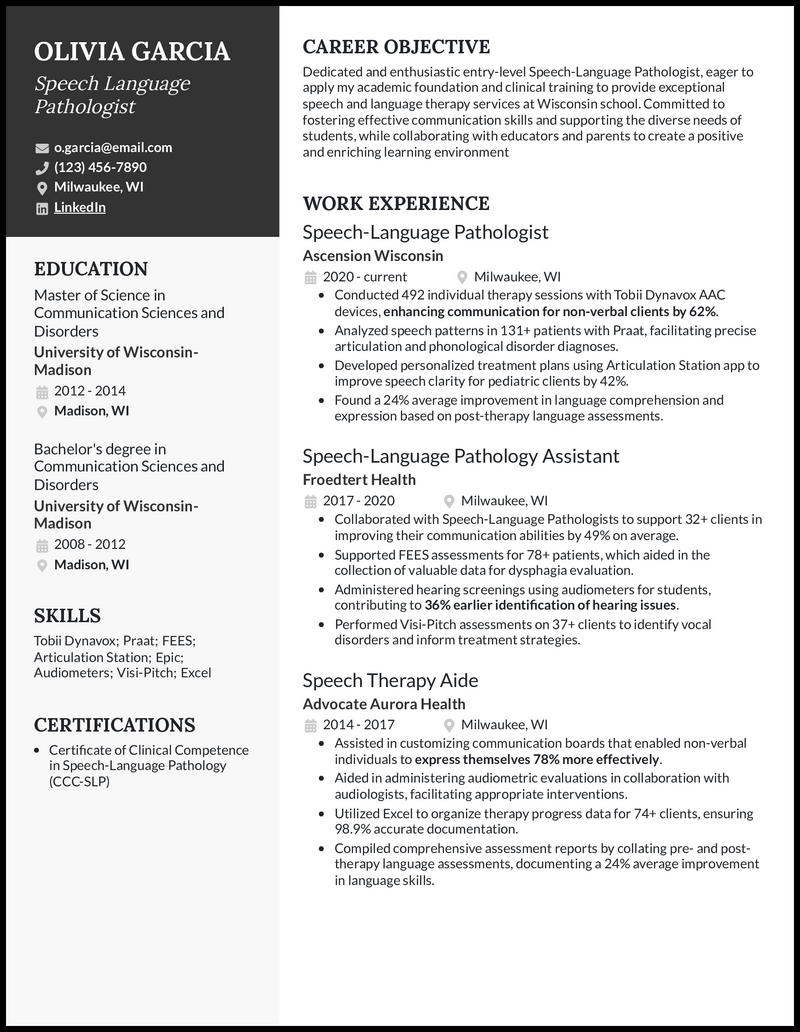
Why this resume works
- Before you can secure a speech language pathologist position, you need to hold certain qualifications. Showcase your Certificate of Clinical Competence (CCC-SLP) and Master of Science in Communication Sciences and Disorders clearly on your speech language pathologist resume.
SLP CF Resume

- Relevant degrees for this role would be in communications sciences and disorders and speech-language pathology. Also, credential from the American Speech-Language-Hearing Association is a welcome addition to your piece. Yet, don’t underestimate the subtle mention of the likes of Fluency and Fluency Disorders certification and Child Language and Language Disorders certification.
Speech Language Pathologist Assistant Resume

- Evidencing a background in audiology offices or working with communication disorders will enhance your speech language pathologist assistant resume.
Speech Language Pathologist Graduate Student Resume

- Any project that helped you build skills like research or speech disorders belongs on your speech language pathologist graduate student resume.
Medical SLP Resume

- Sydney spearheading dysphagia sessions that boosts patient swallow functions at Spaulding and identifying language deficits and facilitating targeted interventions at Kennedy-Donovan are a perfect example of this resume hack. But as always, such outcomes are best backed up with genuine numbers.
Related resume examples
- Chiropractor
- Nutritionist
- Personal Trainer
- Physical Therapist
Tailor Your Speech Language Pathologist Resume to the Job Requirements

Here’s a quick shortcut formula for you: Skills you possess + what the job description asks for = your skills list. It really is just that easy to create the first draft of your skills list , but then you’ll want to narrow things down further so that a single glance tells recruiters “Awesome speech language pathologist here”!
To hone your skills list to a compelling edge, think technically about your job: What exactly do you do during a day at work? You might use “communication skills,” but wouldn’t it be better to list “Patient Consultation” to show how you communicate with patients in a medical, digital setting?
And be specific about skills in terms of nuances alongside angling each skill in favor of your credibility as a speech language pathologist. If you have a favorite handful of software tools that get you through the day, name them.
Need some ideas?
15 popular speech language pathologist skills
- Language Assessment
- Speech Diagnosis
- Patient Interviews
- Speech Studio
- Articulation Station
- Baby Babble
- Speech Blubs
- Pure Tone Audiometer
- Active Listening
- Treatment Plans
Your speech language pathologist work experience bullet points
Now, while we strongly suggest referencing the job description for inspiration while writing your own speech language pathologist resume, don’t repeat any significant portions of it! Reflecting some of their values and working their most common keywords organically into your own experience points is totally different.
Recruiters want to see that you’ve created success in this field, not just that you’ve read the job requirements and repeated them. Leverage your past achievements and accomplishments to show your diagnostic capabilities or aptitude for treatment planning and consultation.
And don’t forget two really important components: Metrics and active language!
You’ll need to provide quantifiable data to back up your stories of successful patient outcomes and improved clinic ratings. And your experiences will sound much better when you set them off with active verbs that pack a punch!
- Percentages of patient improvement demonstrate your effectiveness.
- Personal ratings based on patient feedback show a great bedside manner.
- Patient referral or return rates show the appeal in your methods.
- Labor hours you’ve reduced with your efficiency make you more desirable.
See what we’re talking about?
- Orchestrated virtual Zoom meetings to facilitate 62% more seamless communication among team members across different time zones
- Utilized strong customer assistance skills to achieve a 97% customer satisfaction rate through quick resolution
- Assisted 33+ patients in improving speech clarity and communication skills through the use of Speech Blubs, increasing expressive language abilities by 53%
- Performed Visi-Pitch assessments on 37+ clients to identify vocal disorders and inform treatment strategies, achieving a 4.8/5-star rating
9 active verbs to start your speech language pathologist work experience bullet points
- Orchestrated
- Strategized
3 Tips for Writing a Speech Language Pathologist Resume if You Lack Much Experience
- If you ever completed any internships, paid or unpaid, that helped pave the way to your role as a speech language pathologist . . . include them on your resume! If you gained relevant skills, previous work experiences don’t have to be jobs in the same field.
- If you’re still not satisfied by the way your credentials look on your resume, you can add another section for academic projects related to your field or a relevant degree. As long as they relate to your current job goals and can provide the same details like context and metrics, they’re good!
- If you had any great academic experiences when you really connected with a professor or mentor, see if they’ll write you a professional reference. The same goes for former bosses or managers from previous jobs unrelated to speech language pathology, too.
3 Tips for Writing a Speech Language Pathologist Resume if You’ve Got Some Experience Already
- Now that you have some nice-looking experience under your belt, you can get more selective about which jobs you include in your professional history. Limit yourself to just three or four of the most impressive jobs that will give you the best experience points to bolster your credibility as a speech language pathologist.
- While entry-level applicants might choose a resume objective , you’re better off with a summary if you have plenty of experience. It might be just what you need to establish a personal connection with the company and stand out as extra-qualified when it’s time for interview calls!
- This resume format puts your most recent achievements at the top of the page, making them more likely to catch the reader’s eye. You can also leverage this layout to show a trend of growth by choosing care and diagnosis experience points that get increasingly complicated.
That depends on which of your qualification sections looks the most impressive! If your experiences in speech language pathology are incredible, put them right in the center spotlight. If you have a lot of other sections besides your skills and personal info, like “Internships” or “Awards,” try a column layout.
Honestly, if you’ve done enough research to formulate a solid skills section and frame your experiences according to the individual job listing, you’re probably good here. All the same, check again to make sure there aren’t any other job-related keywords to work in.
Revisit the job description ! Do they focus more on technical stuff like Speech Studio, or interpersonal niches like care planning and patient consultation? Reflect whatever skills they mention the most, both in your skills list and in your examples section.

Nevada Today
Graduate program in speech-language pathology receives national ranking, unr med is recognized by u.s. news & world report as one of the top graduate programs in the country.
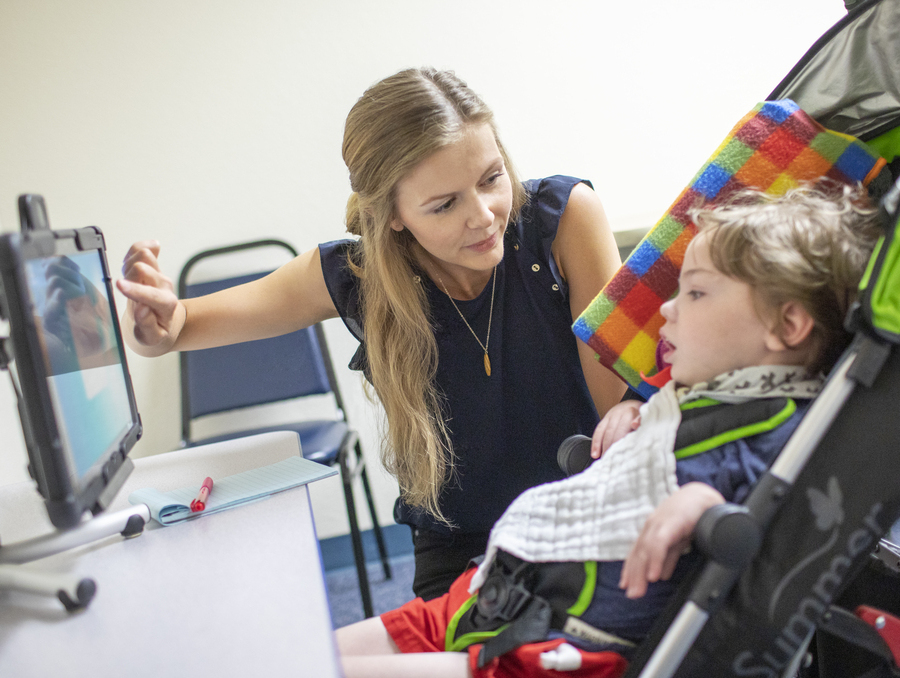
A speech-pathology student working with a young patient as part of her training. Photo by Brin Reynolds.
The University of Nevada, Reno School of Medicine (UNR Med) received recognition from The U.S. News & World Report as offering one of the country’s top graduate programs in Speech-Language Pathology. The program was ranked at #136 of 261 graduate programs nationwide.
“Our undergraduate, master's and Ph.D. programs are supported by dedicated faculty and staff,” shares interim chair Tami Brancamp, Ph.D. “We are proud to serve our communities by providing comprehensive course content and evidence-based clinical education opportunities for our students.”
The U.S. News & World Report 2024 Best Graduate Schools ranks UNR Med’s Speech-Language Pathology program at #136 of 261 programs in the country. The 2024 rankings are scored using survey-based rankings that are based solely on surveys of peer academic leaders. The last ranking of the program was in 2020, when the Speech-Language Pathology program was ranked at #146.
“The need for speech-language pathologists and audiologists continues to grow,” shares Brancamp. “The department and University of Nevada, Reno School of Medicine are excited to support the students who are ready for a great career.”
According to U.S. News, highly ranked programs have strong traditional academic foundations based on the excellence of entering students, graduation rates and instructor credentials. The scores reflect the average rating on a scale from 1-5.
The Speech Pathology and Audiology program at UNR Med celebrated 50 years of graduate education in September of 2023.
Health & Medicine
Wilderness medicine program director leads a life of adventure
Wilderness and sports medicine specialist Arthur "Tony" Islas, M.D., wields his expertise on and off the path

Dedicated to making an impact one syllable at a time
Madelyn Montgomery shares how she found her purpose in Speech-Language Pathology

Finding her ‘why’ – one medical student’s journey
Taree Chadwick, M.D. Class of 2024, shares why she decided to switch career paths and become a doctor
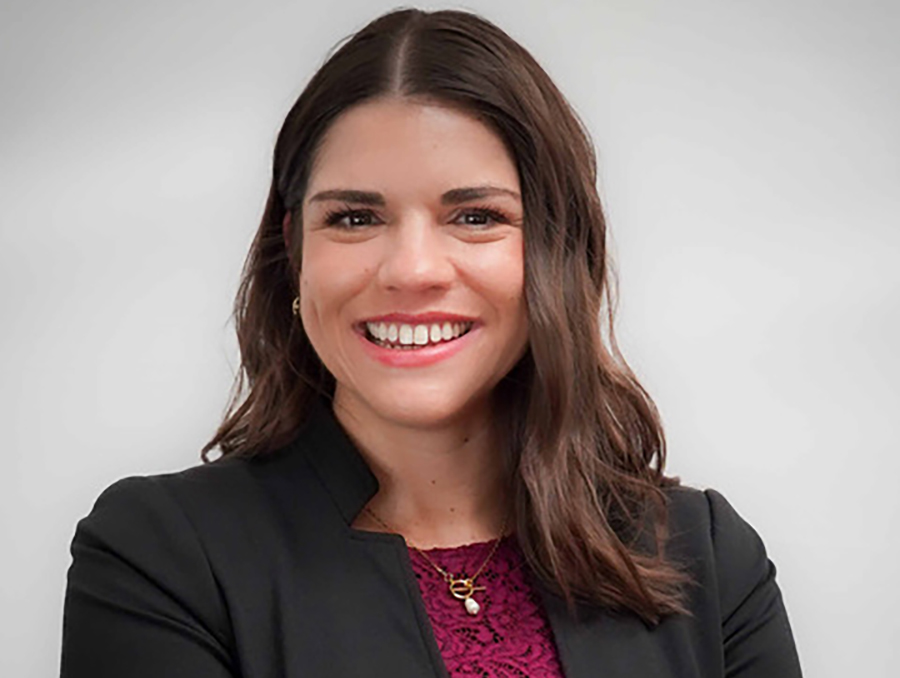
Leading the charge in organ donation awareness with UNR Med's SODA chapter
UNR Med student helps fellow future doctors by promoting organ donation education, debunking myths and advocating for empathy
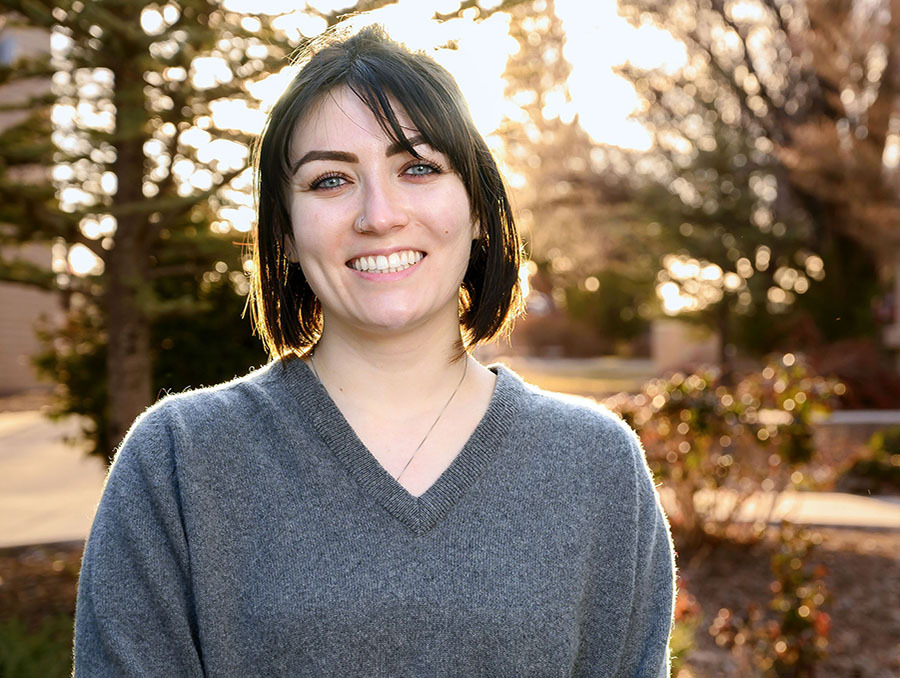
Editor's Picks

Earth Month events focus on increasing campus sustainably, gardening, thrifting and more

Anthropology doctoral candidate places second in regional Three-Minute Thesis Competition

A look at careers of substance and impact

NASA astronaut Eileen Collins shares stories at Women in Space event
Journalism school hosts 59th Scripps Dinner and Lecture, honors four students with scholarships
Steven Waldman, founder and president of Rebuild Local News, was this year’s Scripps lecturer

Classical Tahoe returns to the University of Nevada, Reno at Lake Tahoe
Celebrate music and the beauty of the natural landscape from July 7-August 4

University of Nevada, Reno researcher takes on fight against deadly cattle tick
Pioneering researcher wins highly competitive Fulbright U.S. Scholar Award for collaborative international research project
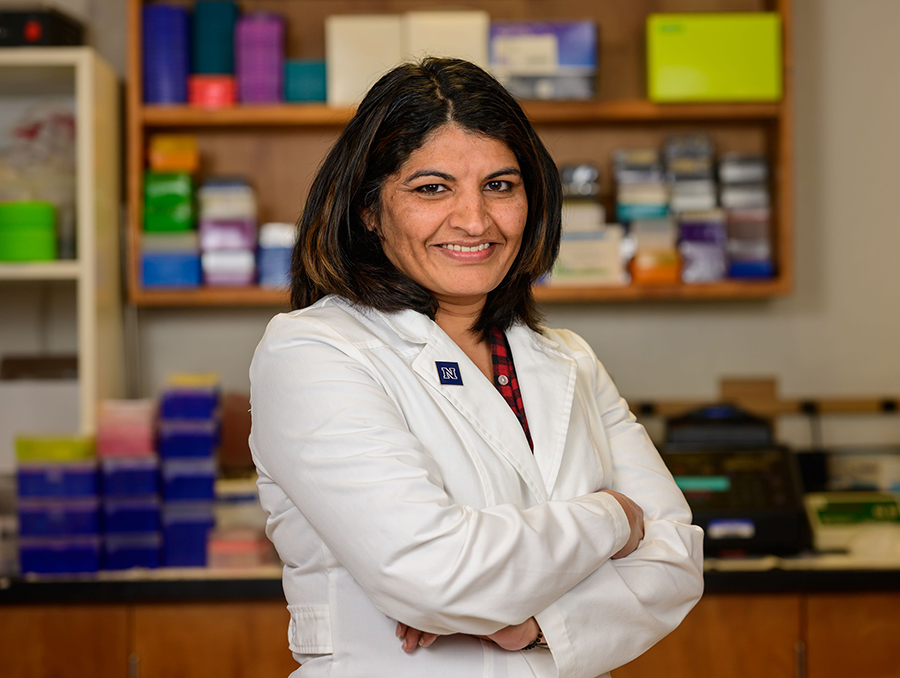
Faces of the Pack: Micah Woodruff
A Q&A with the recipient of the Sam Lieberman Regents’ Award for Student Scholarship
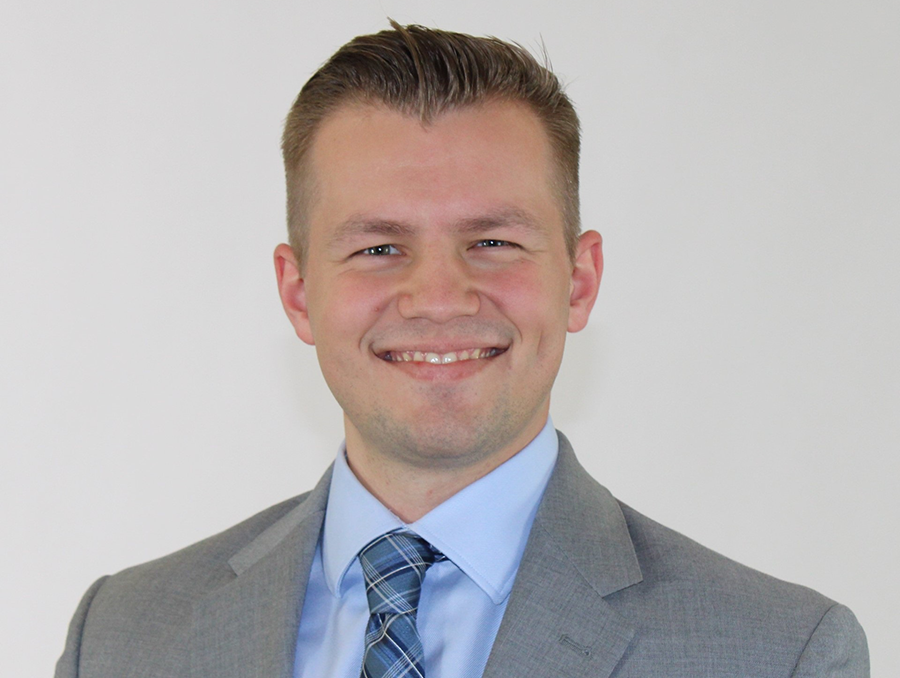
National American Sign Language Day
The College of Liberal Arts celebrates ASL Day, April 15

Neuromechanics Lab leads a state-wide collation for concussion management
The School of Public Health’s Neuromechanics Lab pilots preventative concussion care
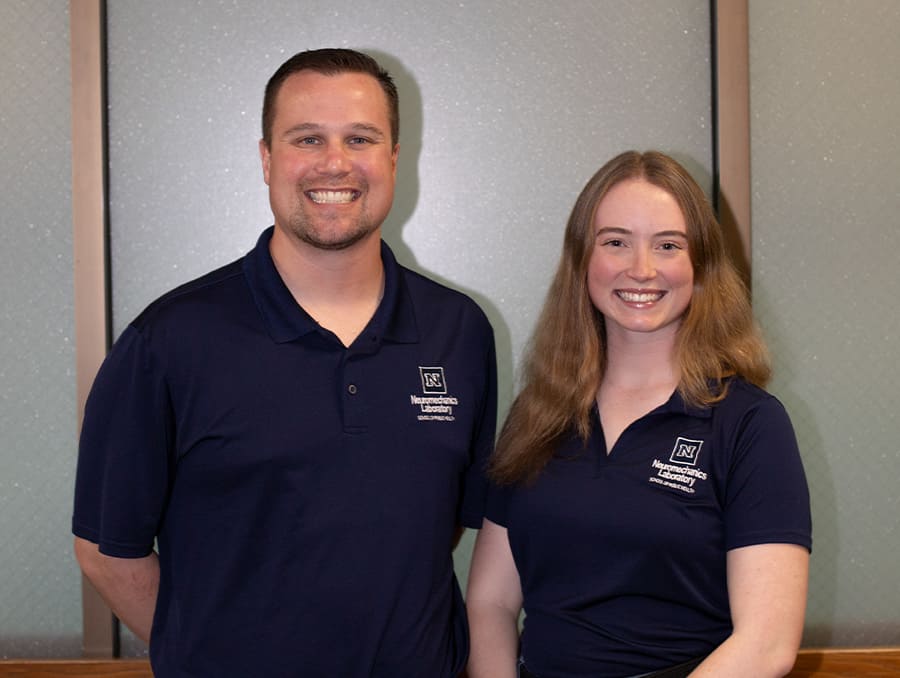
Makerthon competition has students design products to address challenges faced by those experiencing homelessness
Team Mathemusicians takes home $2,000 prize for ‘c-kube,’ a secure storage solution

A brilliant light of leadership shines at the University of Nevada, Reno | Una brillante luz de liderazgo brilla en la Universidad
Karla Hernández, Ph.D., awarded the 2024 Inclusion, Equity, and Diversity Leadership Award
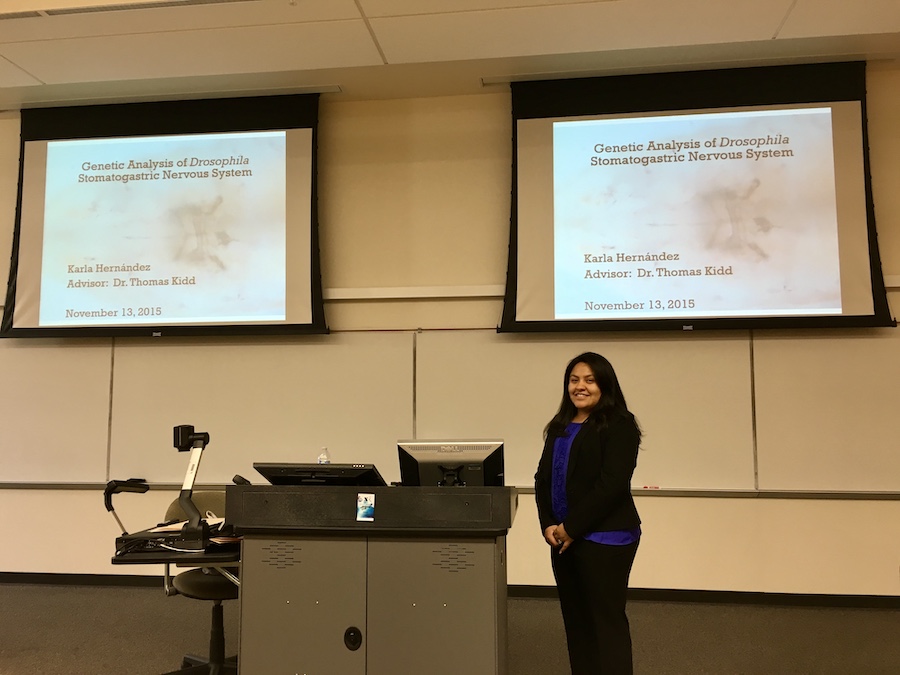
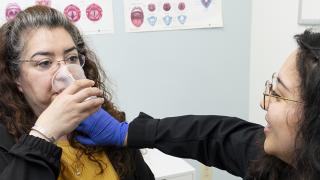
Speech-Language Pathology
Our specialties include the following:.
Difficulty swallowing, or dysphagia can have a negative effect on your health, including:
- Malnutrition/weight loss
- Dehydration
- Aspiration pneumonia
- Chronic lung disease
- Poor general health
City of Hope's speech-language pathologists are uniquely trained to diagnose and manage swallowing disorders within the oncology population using the following assessment tools:
- Clinical swallow evaluation
- Modified barium swallow studies
- Fiberoptic endoscopic evaluation of swallowing
What happens if I have trouble swallowing?
Speech-language pathologists are part of your care team. They have specialized training to manage swallowing disorders. Your speech-language pathologist may recommend changes to your diet or teach you strategies to make it safer and easier to swallow. Download and print out the speech-language pathology recommendations handout before you meet with an speech-language pathologist to document his or her recommendations for you.
Download and print out the speech-language pathologist recommendations handout
How to thicken liquids that your speech-language pathologist recommends you take
Your speech-language pathologist may recommend that you thicken your liquids if you are unable to swallow regular (thin) drinks safely. Download the Mildly Think (Nectar Think) Liquids handout for tips on thickening products.
Download the Mildly Thick (Nectar Thick) Liquids handout
Communication
Your ability to communicate with others involves many systems that can be broken down into the three general categories below. City of Hope's speech-language pathologists provides comprehensive evaluation of each area and individualized therapy based on your goals and needs.
- Speech: The clarity, rate and/or consistency of how the words are spoken
- Language: Ability to understanding/express the meaning of written or spoken language
- Cognitive-Linguistics: Attention, memory, reasoning, problem-solving, insight/awareness and social communication
Voice and Upper Airway Disorders
Voice disorders refer to any changes in the quality, pitch or loudness of your voice that impact your ability to communicate effectively. Certain surgeries can also cause permanent or temporary changes to your voice. The speech-language pathology team at City of Hope performs comprehensive assessment and management of voice disorders, providing the following services:
- Videostroboscopy: Instrumental test to determine the severity/cause of any voice changes and if voice therapy is needed
- Speaking valve: Restores voice/upper airway sensation for patients with tracheostomy
- Tracheoesophageal prosthesis: Voicing option for patients with laryngectomy
Orders are required for inpatient and outpatient services.
- MyServiceNSW
- Manage account
- Logout of MyServiceNSW
Visiting a speech pathologist in Western NSW
Speech pathologists assist people of all ages with communication and swallowing difficulties through tailored therapy and treatment plans, improving their quality of life and wellbeing.
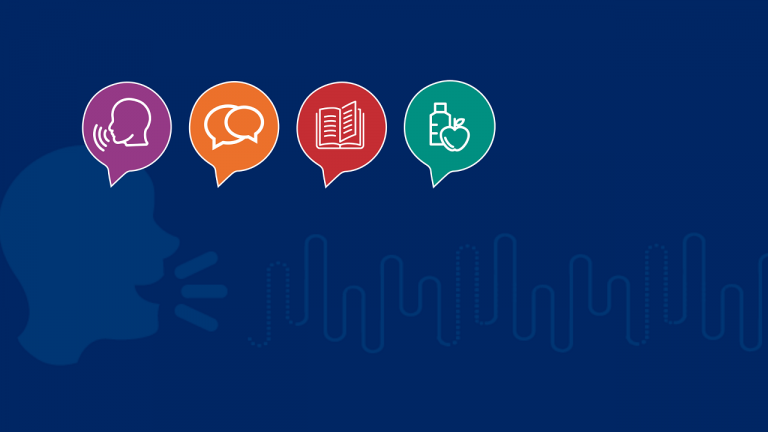
Speech pathologists help children and adults with:
- speech (pronunciation and perception of sounds)
- language (vocabulary, sentences, grammar)
- early literacy skills (supporting reading, spelling, and developing knowledge between letters and sounds)
- fluency (stuttering)
- voice difficulties (hoarse voice, vocal nodules)
- feeding (transitioning to solid food, bottle feeding, safe swallowing and feeding)
- swallowing difficulties (dysphagia).
Speech pathologists help children and adults develop communication and eating skills and support families, carers, educators and others to help.
Speech pathologists work in a range of settings, including community health centres, hospitals, educational settings, early intervention, and private practice.
Speech pathologists have university training and are also called speech-language pathologists, speech and language therapists, and speech therapists in other parts of the world.
When visiting a speech pathologist you may come across terms you are not familiar with.
See below or download a handout with definitions of common speech pathology words (glossary) (PDF 406.3KB) .
Ask your speech pathologist (or other health professional) if you would like further information.
How to know if you need to visit a speech pathologist
If you have concerns that a child is not listening or talking like other children their age, you can refer to a speech pathologist for further advice.
For information about what to expect from children at different ages, visit Speech Pathology Australia - Communication Milestones.
What happens when a child visits a speech pathologist
Speech pathologists often assess children by playing games or activities with them or showing them pictures while observing and listening to their talking. They will ask parents/caregivers questions about their concerns and about the child’s development. Sometimes assessment can take more than one session.
Speech pathologists then discuss options about will happen next. Children may be referred to other health professionals who look at different aspects of development (e.g., audiologist for a hearing assessment, paediatrician, physiotherapist, or occupational therapist). There may be some other services that children can access to support their development. Speech pathologists also explain if children should access therapy, and where, when, and how often this is likely to occur. Some children may be reviewed at a later time to see how they are progressing.
Speech pathologists work with important people in children’s lives (e.g., parents, educators) to set intervention goals. Speech pathologists work with children on their specific areas of difficulty during games and activities in sessions. They demonstrate activities and strategies to help children achieve success and improve in their area/s of difficulty. They recommend activities that can be done at home and school in everyday life to help children with their speech, language, and literacy development.
Knowing what to expect at an appointment can help you think about questions the speech pathologist might ask, what you are most concerned about, and preparing your child.
Information about visiting a speech pathologist is outlined below or can be downloaded (PDF 350.47KB) .
During the appointment
The speech pathologist will talk to you about your concerns and ask some questions about your child’s history. Questions can include information about:
- Your child (e.g., what they like doing).
- Your main areas of concern.
- Pregnancy and birth history.
- Milestones such as crawling, walking, and first words.
- Hearing assessments, infections or difficulties.
- If your child had/has any difficulties eating or drinking.
- Preschool and primary school education.
The speech pathologist will complete assessments with your child. This can sometimes look like play. The speech pathologist actually will be looking at how your child communicates during familiar activities. Your child may be asked to say some words, or point to pictures. Some assessments can take longer, and may require another appointment to finish. The speech pathologist may also look at your child’s lips, teeth, tongue and the back of their mouth.
What happens next
Sometimes the speech pathologist is able to give you their recommendations during the first appointment, or they may need to look at the assessment results first. What happens next depends on the service and the needs of your child. Things that might happen include:
- Booking another appointment to complete the assessment/s or to talk about recommendations (results) or strategies to support your child’s communication.
- Suggesting referrals to other services such as a paediatrician assessment, a hearing test, or other health services.
- Discussing therapy including waiting times, how much and what this involves, or if there are other services for your child.
- Waiting or reviewing when your child is older.
The above is generic advice and will depend on your child and the service you are attending. Always ask questions if you are not sure.
Tip: Speech pathologists will often ask if your child has had their hearing checked. You can screen your child’s hearing using the Sound Scouts app .
How to find a speech pathologist
To find a speech pathology service near you, please contact your local community health centre or visit the Speech Pathology Australia website.
Please note: This web page has been developed for families by Western NSW Local Health District and Charles Sturt University, as part of a NSW Health Translational Research Grant titled “Waiting for speech pathology: Device versus advice?”.
1 hr 14 min
321 – The Effective SLP: Productivity & Streamlining Success Swallow Your Pride Podcast
You’ve heard “qualified” SLP…. You’ve heard “seasoned” SLP… But what does it mean to be an “effective” SLP, particularly in the medical space?The truth is: as a medical SLP, you have more power over your productivity than you think.Speech-language pathologist, clinical mentor, and rehabilitation program development specialist, Lysa Johnson, returns to the Swallow Your Pride podcast to join Theresa in discussing a word not too many medical SLPs enjoy: productivity.The pair define, dissect, and discuss what productivity means and how to better control it (instead of letting IT control YOU). So, let’s figure out what productivity means for you, your facility, and maybe even the future of speech pathology.Remember, defining productivity isn’t just about numbers; it’s about setting the stage for change. Whether it’s redefining productivity or just finding better ways to measure success, let’s do it together, one conversation at a time. Get the show notes for this episode her: https://syppodcast.com/320 Timestamps The definition of productivity (00:03:30) Challenges with productivity (00:04:23) The impact of productivity in different settings (00:05:59) Understanding pure productivity (00:08:48) Nuances of productivity (00:16:29) Defining billable and non-billable time (00:21:15) The importance of patient screens (00:23:07) Understanding productivity and reimbursement meetings (00:24:36) Ethical billing practices and productivity (00:26:04) The necessity of therapy screens (00:27:54) Non-billable but required tasks (00:32:01) Unethical practices and fraudulent services (00:34:04) Role of speech pathologists in skilled nursing facilities (00:40:56) Compliance with labor laws and ethical practices (00:43:11) Understanding the rules and regulations (00:46:36) Challenges in justifying non-billable time (00:50:12) The importance of starting somewhere (00:50:21) Ethical concerns and resources (00:51:27) Seeking support and resources (00:52:20) Interview questions and facility assessment (00:55:46) Advocating for change and future generations (00:56:54) New CPT codes for family and caregiver training (00:57:57) Membership and support for speech-language pathologists (01:00:59) Accommodations and onboarding for learning differences (01:07:31) Continuing education and resources (01:08:39)
- Episode Website
- More Episodes
- ©2023 Theresa Richard
Top Podcasts In Education

IMAGES
VIDEO
COMMENTS
A speech-language pathologist (SLP), also known as a speech therapist, is a health professional who diagnoses and treats communication and swallowing problems. They work with both children and ...
SLPs work with people of all ages, from babies to adults. SLPs treat many types of communication and swallowing problems. These include problems with: Speech sounds —how we say sounds and put sounds together into words. Other words for these problems are articulation or phonological disorders, apraxia of speech, or dysarthria.
Speech-language pathology (also known as speech and language pathology or logopedics) is a healthcare and academic discipline concerning the evaluation, treatment, and prevention of communication disorders, including expressive and mixed receptive-expressive language disorders, voice disorders, speech sound disorders, speech disfluency, pragmatic language impairments, and social ...
A speech-language pathologist (SLP) diagnoses and treats conditions that affect your ability to communicate and swallow. SLPs work with people of all ages. As experts in communication, these specialists assess, diagnose, treat and prevent speech, language, voice and swallowing disorders from birth through old age.
Speech-language pathologists (SLPs) work to prevent, assess, diagnose, and treat speech, language, social communication, cognitive-communication, and swallowing disorders in children and adults. Speech disorders occur when a person has difficulty producing speech sounds correctly or fluently (e.g., stuttering is a form of disfluency) or has ...
Speech-language pathology is the scientific study of speech, fluency, feeding and swallowing, and all the mechanisms of speech and language, along with the therapeutic application of corrective and augmentative measures to help people with speech disorders speak and communicate better. It falls under the communication sciences and disorders ...
Also Known as a Speech-Language Pathologist (SLP) or Speech Therapist. A speech pathologist, also known as a speech therapist, is a healthcare professional who helps you improve your speech and communication if you have been ill, injured, or have a chronic disability. Speech pathologists may also be called speech-language pathologists (SLP).
About Speech-Language Pathology. Speech disorders occur when a person is unable to produce speech sounds correctly or fluently, or has problems with their voice or resonance. Language disorders occur when a person has trouble understanding others (receptive language), or sharing thoughts, ideas, and feelings (expressive language). Read more.
A speech-language pathologist is responsible for assessing, diagnosing, treating and developing plans of care to help improve, maintain and restore certain skills and functions in their clients. Such functions include: Articulation or phonological disorders, such as dysarthria or apraxia of speech. Language processing challenges.
Speech language pathologists play an important role in the assessment, diagnosis, and treatment of communication and swallowing disorders. They employ a range of evidence-based techniques and technologies to help their clients improve their communication and swallowing abilities. By providing personalized therapy plans, counseling, and ...
A speech-language pathologist working in the US earns an average of $79,060 a year, or about $38.01 an hour. As of 2020, this average is reflective of all of the 158,100 jobs available [1]. Factors like certifications, location, work schedule, and the employer will affect a speech-language pathologist's salary.
Speech-language pathologists (SLPs) are communication specialists who treat speech, language, communication and swallowing disorders. 1 As part of their work, they may do the following 2,1: Evaluate and diagnose speech, language, voice and fluency disorders in children and adults. Develop therapies to help patients improve their ability to swallow.
A speech-language pathologist (often abbreviated to SLP) is a professional trained to be an expert in all aspects of speech and communication. As such, SLPs provide a range of services to their patients and clients. The most well-known of these services revolve around speech (speech sounds, language, literacy, fluency). SLPs also provide a ...
Speech Language Pathology Process. Speech language pathology is a process that involves several steps to identify and address communication and language challenges. Here are the steps involved in the SLP process: Step 1: Assessment. The assessment process involves gathering information about the individual's communication and language abilities.
Speech-language pathology refers to the clinical practice and the study of the science, development, and disorders of speech, language, communication, and swallowing. Areas of practice and study include anatomy, neuroanatomy, articulation, fluency, voice and resonance, receptive and expressive language, cognitive-communication ability, brain ...
A career in speech language pathology involves helping individuals with swallowing and communication disorders to improve their quality of life. SLPs play a valuable role in their patients' development and wellbeing. Practitioners in the field of speech therapy, who must obtain at least a master's in speech pathology degree, are expected to use high-quality and collaborative research and ...
Speech-language pathology is a field of clinical practice that is performed by certified speech-language pathologists. These clinicians are qualified experts and work to prevent, evaluate, diagnose, and treat a range of issues, including speech, language, social communication, cognitive communication, voice, feeding and swallowing, and more. In ...
A speech-language pathologist (SLP) is a healthcare professional who specializes in speech and language disorders. An SLP will evaluate a person for groups of symptoms that indicate one type of ...
The income of speech-language pathologists can differ due to various factors. Here's a basic overview of the salary spectrum for speech-language pathologists at different stages, using data from glassdoor.com:. Entry Salary (US$86k); Median Salary (US$103k); Executive Salary (US$124k); It's noteworthy that the average salary of speech-language pathologists in the United States surpasses ...
Speech is how we say sounds and words. Speech includes: How we make speech sounds using the mouth, lips, and tongue. For example, we need to be able to say the "r" sound to say "rabbit" instead of "wabbit.". How we use our vocal folds and breath to make sounds. Our voice can be loud or soft or high- or low-pitched.
Speech-language pathologist definition: a person who specializes in the diagnosis and treatment of speech and voice disorders, as stuttering, lisping, or lalling, and of language disturbances, as aphasia or delayed language acquisition. Abbreviation. See examples of SPEECH-LANGUAGE PATHOLOGIST used in a sentence.
Speech-language pathology is the discipline dealing with the assessment and management of communication disorders due to speech and language breakdown, including disorders of articulation / phonology, voice, fluency and feeding / swallowing. If you are passionate about communication and want to make a difference in peoples' lives then this may be the career for you! The field offers wide ...
5 Speech Langauge Pathologist. (SLP) Resume Examples for 2024. Stephen Greet March 22, 2024. When a patient's speech, swallowing, language, or voice is affected, you're there to diagnose them and help develop treatment plans. You also provide insight on whether speech or language therapy is necessary to help the patient communicate well.
The last ranking of the program was in 2020, when the Speech-Language Pathology program was ranked at #146. "The need for speech-language pathologists and audiologists continues to grow," shares Brancamp. "The department and University of Nevada, Reno School of Medicine are excited to support the students who are ready for a great career.".
Language is a system of patterns and symbols used to communicate. It is defined as the comprehension and/or use of a spoken (i.e., listening and speaking), written (i.e., reading and writing), and/or signed (e.g., American Sign Language) communication system. In some cases, individuals may use augmentative and alternative communication (AAC) to ...
City of Hope's speech-language pathologists provides comprehensive evaluation of each area and individualized therapy based on your goals and needs. Speech: The clarity, rate and/or consistency of how the words are spoken; Language: Ability to understanding/express the meaning of written or spoken language
Speech pathologists have university training and are also called speech-language pathologists, speech and language therapists, and speech therapists in other parts of the world. ... The content and meaning of a person's language. Syllable: The beats a word can be broken into. For example, daddy has 2 syllables da-di and hippopotamus has 5 ...
You've heard "qualified" SLP…. You've heard "seasoned" SLP… But what does it mean to be an "effective" SLP, particularly in the medical space?The truth is: as a medical SLP, you have more power over your productivity than you think.Speech-language pathologist, clinical mentor, and rehabilitation program development specialist, Lysa Johnson, returns to the Swallow Your Pride ...